
Github-Ranking-AI
A list of the most popular AI Topic repositories on GitHub based on the number of stars they have received.| AI相关主题Github仓库排名,每日自动更新。
Stars: 369
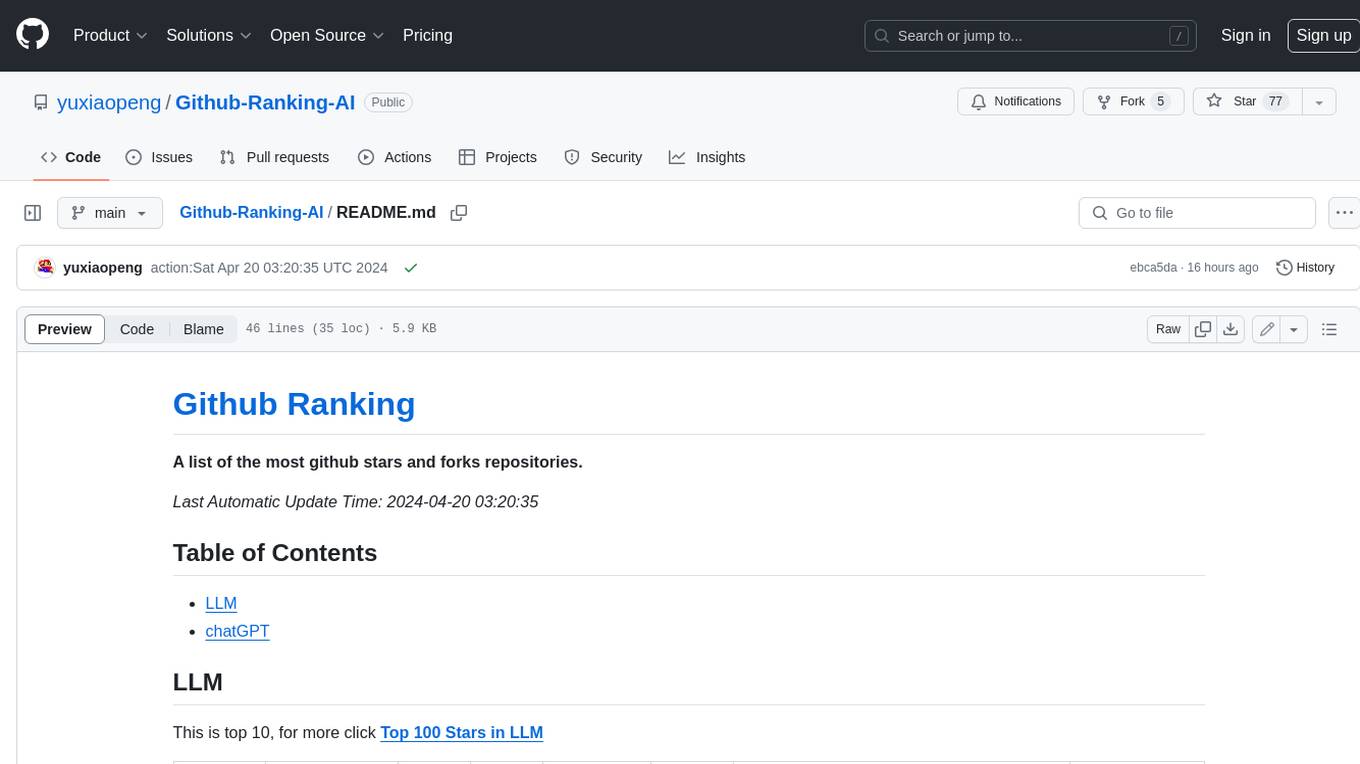
This repository provides a list of the most starred and forked repositories on GitHub. It is updated automatically and includes information such as the project name, number of stars, number of forks, language, number of open issues, description, and last commit date. The repository is divided into two sections: LLM and chatGPT. The LLM section includes repositories related to large language models, while the chatGPT section includes repositories related to the chatGPT chatbot.
README:
A list of the most github stars and forks repositories.
Last Automatic Update Time: 2026-02-09T05:11:42Z
- LLM
- ChatGPT
- OpenAI
- Deepseek
- LLaMA
- Chatbot
- AI Agents
- Claude
- RAG
- Mistral
- Transformer
- MoE
- AGI
- Generative_AI
- AI
This is top 10, for more click Top 100 Stars in LLM
| Ranking | Project Name | Stars | Forks | Language | Open Issues | Description | Last Commit |
|---|---|---|---|---|---|---|---|
| 1 | ollama | 162194 | 14509 | Go | 1949 | Get up and running with Kimi-K2.5, GLM-4.7, DeepSeek, gpt-oss, Qwen, Gemma and other models. | 2026-02-07T23:49:53Z |
| 2 | transformers | 156246 | 32001 | Python | 1089 | 🤗 Transformers: the model-definition framework for state-of-the-art machine learning models in text, vision, audio, and multimodal models, for both inference and training. | 2026-02-09T05:08:34Z |
| 3 | prompts.chat | 144836 | 19138 | HTML | 2 | a.k.a. Awesome ChatGPT Prompts. Share, discover, and collect prompts from the community. Free and open source — self-host for your organization with complete privacy. | 2026-02-07T03:48:48Z |
| 4 | dify | 129096 | 20077 | TypeScript | 425 | Production-ready platform for agentic workflow development. | 2026-02-09T04:12:42Z |
| 5 | langchain | 126274 | 20761 | Python | 257 | 🦜🔗 The platform for reliable agents. | 2026-02-09T04:53:22Z |
| 6 | open-webui | 123335 | 17405 | Python | 164 | User-friendly AI Interface (Supports Ollama, OpenAI API, ...) | 2026-02-09T05:06:49Z |
| 7 | llama.cpp | 94669 | 14821 | C++ | 384 | LLM inference in C/C++ | 2026-02-09T02:04:35Z |
| 8 | awesome-llm-apps | 92902 | 13477 | Python | 1 | Collection of awesome LLM apps with AI Agents and RAG using OpenAI, Anthropic, Gemini and opensource models. | 2026-02-08T22:48:45Z |
| 9 | LLMs-from-scratch | 84887 | 12842 | Jupyter Notebook | 0 | Implement a ChatGPT-like LLM in PyTorch from scratch, step by step | 2026-01-29T22:51:17Z |
| 10 | firecrawl | 80600 | 5958 | TypeScript | 37 | 🔥 The Web Data API for AI - Turn entire websites into LLM-ready markdown or structured data | 2026-02-08T16:41:11Z |
This is top 10, for more click Top 100 Stars in ChatGPT
| Ranking | Project Name | Stars | Forks | Language | Open Issues | Description | Last Commit |
|---|---|---|---|---|---|---|---|
| 1 | prompts.chat | 144836 | 19138 | HTML | 2 | a.k.a. Awesome ChatGPT Prompts. Share, discover, and collect prompts from the community. Free and open source — self-host for your organization with complete privacy. | 2026-02-07T03:48:48Z |
| 2 | langflow | 144651 | 8431 | Python | 341 | Langflow is a powerful tool for building and deploying AI-powered agents and workflows. | 2026-02-09T02:59:42Z |
| 3 | langchain | 126274 | 20761 | Python | 257 | 🦜🔗 The platform for reliable agents. | 2026-02-09T04:53:22Z |
| 4 | generative-ai-for-beginners | 106229 | 56920 | Jupyter Notebook | 6 | 21 Lessons, Get Started Building with Generative AI | 2026-02-09T03:45:03Z |
| 5 | NextChat | 87256 | 60428 | TypeScript | 682 | ✨ Light and Fast AI Assistant. Support: Web | iOS | MacOS | Android | Linux | Windows | 2025-12-02T17:05:02Z |
| 6 | LLMs-from-scratch | 84887 | 12842 | Jupyter Notebook | 0 | Implement a ChatGPT-like LLM in PyTorch from scratch, step by step | 2026-01-29T22:51:17Z |
| 7 | lobehub | 72096 | 14616 | TypeScript | 609 | The ultimate space for work and life — to find, build, and collaborate with agent teammates that grow with you. We are taking agent harness to the next level — enabling multi-agent collaboration, effortless agent team design, and introducing agents as the unit of work interaction. | 2026-02-09T04:34:54Z |
| 8 | openai-cookbook | 71380 | 11964 | Jupyter Notebook | 68 | Examples and guides for using the OpenAI API | 2026-02-07T10:58:25Z |
| 9 | Prompt-Engineering-Guide | 70118 | 7494 | MDX | 162 | 🐙 Guides, papers, lessons, notebooks and resources for prompt engineering, context engineering, RAG, and AI Agents. | 2026-02-01T21:11:28Z |
| 10 | gpt_academic | 70092 | 8407 | Python | 273 | 为GPT/GLM等LLM大语言模型提供实用化交互接口,特别优化论文阅读/润色/写作体验,模块化设计,支持自定义快捷按钮&函数插件,支持Python和C++等项目剖析&自译解功能,PDF/LaTex论文翻译&总结功能,支持并行问询多种LLM模型,支持chatglm3等本地模型。接入通义千问, deepseekcoder, 讯飞星火, 文心一言, llama2, rwkv, claude2, moss等。 | 2026-01-25T12:33:10Z |
This is top 10, for more click Top 100 Stars in OpenAI
| Ranking | Project Name | Stars | Forks | Language | Open Issues | Description | Last Commit |
|---|---|---|---|---|---|---|---|
| 1 | AutoGPT | 181736 | 46262 | Python | 240 | AutoGPT is the vision of accessible AI for everyone, to use and to build on. Our mission is to provide the tools, so that you can focus on what matters. | 2026-02-09T05:07:07Z |
| 2 | prompts.chat | 144836 | 19138 | HTML | 2 | a.k.a. Awesome ChatGPT Prompts. Share, discover, and collect prompts from the community. Free and open source — self-host for your organization with complete privacy. | 2026-02-07T03:48:48Z |
| 3 | dify | 129096 | 20077 | TypeScript | 425 | Production-ready platform for agentic workflow development. | 2026-02-09T04:12:42Z |
| 4 | langchain | 126274 | 20761 | Python | 257 | 🦜🔗 The platform for reliable agents. | 2026-02-09T04:53:22Z |
| 5 | open-webui | 123335 | 17405 | Python | 164 | User-friendly AI Interface (Supports Ollama, OpenAI API, ...) | 2026-02-09T05:06:49Z |
| 6 | generative-ai-for-beginners | 106229 | 56920 | Jupyter Notebook | 6 | 21 Lessons, Get Started Building with Generative AI | 2026-02-09T03:45:03Z |
| 7 | awesome-llm-apps | 92902 | 13477 | Python | 1 | Collection of awesome LLM apps with AI Agents and RAG using OpenAI, Anthropic, Gemini and opensource models. | 2026-02-08T22:48:45Z |
| 8 | markitdown | 86602 | 5023 | Python | 304 | Python tool for converting files and office documents to Markdown. | 2026-01-08T23:21:33Z |
| 9 | ragflow | 72999 | 8084 | Python | 2900 | RAGFlow is a leading open-source Retrieval-Augmented Generation (RAG) engine that fuses cutting-edge RAG with Agent capabilities to create a superior context layer for LLMs | 2026-02-09T04:08:12Z |
| 10 | lobehub | 72096 | 14616 | TypeScript | 609 | The ultimate space for work and life — to find, build, and collaborate with agent teammates that grow with you. We are taking agent harness to the next level — enabling multi-agent collaboration, effortless agent team design, and introducing agents as the unit of work interaction. | 2026-02-09T04:34:54Z |
This is top 10, for more click Top 100 Stars in Deepseek
| Ranking | Project Name | Stars | Forks | Language | Open Issues | Description | Last Commit |
|---|---|---|---|---|---|---|---|
| 1 | ollama | 162194 | 14509 | Go | 1949 | Get up and running with Kimi-K2.5, GLM-4.7, DeepSeek, gpt-oss, Qwen, Gemma and other models. | 2026-02-07T23:49:53Z |
| 2 | transformers | 156246 | 32001 | Python | 1089 | 🤗 Transformers: the model-definition framework for state-of-the-art machine learning models in text, vision, audio, and multimodal models, for both inference and training. | 2026-02-09T05:08:34Z |
| 3 | DeepSeek-V3 | 101488 | 16506 | Python | 35 | None | 2025-08-28T03:24:37Z |
| 4 | DeepSeek-R1 | 91837 | 11780 | None | 20 | None | 2025-06-27T08:35:54Z |
| 5 | ragflow | 72999 | 8084 | Python | 2900 | RAGFlow is a leading open-source Retrieval-Augmented Generation (RAG) engine that fuses cutting-edge RAG with Agent capabilities to create a superior context layer for LLMs | 2026-02-09T04:08:12Z |
| 6 | lobehub | 72096 | 14616 | TypeScript | 609 | The ultimate space for work and life — to find, build, and collaborate with agent teammates that grow with you. We are taking agent harness to the next level — enabling multi-agent collaboration, effortless agent team design, and introducing agents as the unit of work interaction. | 2026-02-09T04:34:54Z |
| 7 | vllm | 69828 | 13294 | Python | 1712 | A high-throughput and memory-efficient inference and serving engine for LLMs | 2026-02-09T03:48:19Z |
| 8 | LlamaFactory | 67061 | 8152 | Python | 884 | Unified Efficient Fine-Tuning of 100+ LLMs & VLMs (ACL 2024) | 2026-02-09T02:40:44Z |
| 9 | gpt4free | 65730 | 13682 | Python | 6 | The official gpt4free repository | various collection of powerful language models | o4, o3 and deepseek r1, gpt-4.1, gemini 2.5 | 2026-02-08T02:18:43Z |
| 10 | anything-llm | 54356 | 5854 | JavaScript | 252 | The all-in-one Desktop & Docker AI application with built-in RAG, AI agents, No-code agent builder, MCP compatibility, and more. | 2026-02-08T22:35:52Z |
This is top 10, for more click Top 100 Stars in LLaMA
| Ranking | Project Name | Stars | Forks | Language | Open Issues | Description | Last Commit |
|---|---|---|---|---|---|---|---|
| 1 | ollama | 162194 | 14509 | Go | 1949 | Get up and running with Kimi-K2.5, GLM-4.7, DeepSeek, gpt-oss, Qwen, Gemma and other models. | 2026-02-07T23:49:53Z |
| 2 | llama.cpp | 94669 | 14821 | C++ | 384 | LLM inference in C/C++ | 2026-02-09T02:04:35Z |
| 3 | vllm | 69828 | 13294 | Python | 1712 | A high-throughput and memory-efficient inference and serving engine for LLMs | 2026-02-09T03:48:19Z |
| 4 | LlamaFactory | 67061 | 8152 | Python | 884 | Unified Efficient Fine-Tuning of 100+ LLMs & VLMs (ACL 2024) | 2026-02-09T02:40:44Z |
| 5 | llama | 59129 | 9827 | Python | 458 | Inference code for Llama models | 2025-01-26T21:42:26Z |
| 6 | unsloth | 51764 | 4275 | Python | 847 | Fine-tuning & Reinforcement Learning for LLMs. 🦥 Train OpenAI gpt-oss, DeepSeek, Qwen, Llama, Gemma, TTS 2x faster with 70% less VRAM. | 2026-02-09T04:18:27Z |
| 7 | llama_index | 46875 | 6795 | Python | 248 | LlamaIndex is the leading framework for building LLM-powered agents over your data. | 2026-02-09T04:51:17Z |
| 8 | LocalAI | 42682 | 3540 | Go | 141 | 🤖 The free, Open Source alternative to OpenAI, Claude and others. Self-hosted and local-first. Drop-in replacement, running on consumer-grade hardware. No GPU required. Runs gguf, transformers, diffusers and many more. Features: Generate Text, MCP, Audio, Video, Images, Voice Cloning, Distributed, P2P and decentralized inference | 2026-02-08T23:11:34Z |
| 9 | aider | 40444 | 3877 | Python | 1146 | aider is AI pair programming in your terminal | 2026-01-19T15:39:28Z |
| 10 | quivr | 38924 | 3720 | Python | 3 | Opiniated RAG for integrating GenAI in your apps 🧠 Focus on your product rather than the RAG. Easy integration in existing products with customisation! Any LLM: GPT4, Groq, Llama. Any Vectorstore: PGVector, Faiss. Any Files. Anyway you want. | 2025-07-09T12:55:23Z |
This is top 10, for more click Top 100 Stars in Chatbot
| Ranking | Project Name | Stars | Forks | Language | Open Issues | Description | Last Commit |
|---|---|---|---|---|---|---|---|
| 1 | LLMs-from-scratch | 84887 | 12842 | Jupyter Notebook | 0 | Implement a ChatGPT-like LLM in PyTorch from scratch, step by step | 2026-01-29T22:51:17Z |
| 2 | funNLP | 78894 | 15141 | Python | 37 | 中英文敏感词、语言检测、中外手机/电话归属地/运营商查询、名字推断性别、手机号抽取、身份证抽取、邮箱抽取、中日文人名库、中文缩写库、拆字词典、词汇情感值、停用词、反动词表、暴恐词表、繁简体转换、英文模拟中文发音、汪峰歌词生成器、职业名称词库、同义词库、反义词库、否定词库、汽车品牌词库、汽车零件词库、连续英文切割、各种中文词向量、公司名字大全、古诗词库、IT词库、财经词库、成语词库、地名词库、历史名人词库、诗词词库、医学词库、饮食词库、法律词库、汽车词库、动物词库、中文聊天语料、中文谣言数据、百度中文问答数据集、句子相似度匹配算法集合、bert资源、文本生成&摘要相关工具、cocoNLP信息抽取工具、国内电话号码正则匹配、清华大学XLORE:中英文跨语言百科知识图谱、清华大学人工智能技术系列报告、自然语言生成、NLU太难了系列、自动对联数据及机器人、用户名黑名单列表、罪名法务名词及分类模型、微信公众号语料、cs224n深度学习自然语言处理课程、中文手写汉字识别、中文自然语言处理 语料/数据集、变量命名神器、分词语料库+代码、任务型对话英文数据集、ASR 语音数据集 + 基于深度学习的中文语音识别系统、笑声检测器、Microsoft多语言数字/单位/如日期时间识别包、中华新华字典数据库及api(包括常用歇后语、成语、词语和汉字)、文档图谱自动生成、SpaCy 中文模型、Common Voice语音识别数据集新版、神经网络关系抽取、基于bert的命名实体识别、关键词(Keyphrase)抽取包pke、基于医疗领域知识图谱的问答系统、基于依存句法与语义角色标注的事件三元组抽取、依存句法分析4万句高质量标注数据、cnocr:用来做中文OCR的Python3包、中文人物关系知识图谱项目、中文nlp竞赛项目及代码汇总、中文字符数据、speech-aligner: 从“人声语音”及其“语言文本”产生音素级别时间对齐标注的工具、AmpliGraph: 知识图谱表示学习(Python)库:知识图谱概念链接预测、Scattertext 文本可视化(python)、语言/知识表示工具:BERT & ERNIE、中文对比英文自然语言处理NLP的区别综述、Synonyms中文近义词工具包、HarvestText领域自适应文本挖掘工具(新词发现-情感分析-实体链接等)、word2word:(Python)方便易用的多语言词-词对集:62种语言/3,564个多语言对、语音识别语料生成工具:从具有音频/字幕的在线视频创建自动语音识别(ASR)语料库、构建医疗实体识别的模型(包含词典和语料标注)、单文档非监督的关键词抽取、Kashgari中使用gpt-2语言模型、开源的金融投资数据提取工具、文本自动摘要库TextTeaser: 仅支持英文、人民日报语料处理工具集、一些关于自然语言的基本模型、基于14W歌曲知识库的问答尝试--功能包括歌词接龙and已知歌词找歌曲以及歌曲歌手歌词三角关系的问答、基于Siamese bilstm模型的相似句子判定模型并提供训练数据集和测试数据集、用Transformer编解码模型实现的根据Hacker News文章标题自动生成评论、用BERT进行序列标记和文本分类的模板代码、LitBank:NLP数据集——支持自然语言处理和计算人文学科任务的100部带标记英文小说语料、百度开源的基准信息抽取系统、虚假新闻数据集、Facebook: LAMA语言模型分析,提供Transformer-XL/BERT/ELMo/GPT预训练语言模型的统一访问接口、CommonsenseQA:面向常识的英文QA挑战、中文知识图谱资料、数据及工具、各大公司内部里大牛分享的技术文档 PDF 或者 PPT、自然语言生成SQL语句(英文)、中文NLP数据增强(EDA)工具、英文NLP数据增强工具 、基于医药知识图谱的智能问答系统、京东商品知识图谱、基于mongodb存储的军事领域知识图谱问答项目、基于远监督的中文关系抽取、语音情感分析、中文ULMFiT-情感分析-文本分类-语料及模型、一个拍照做题程序、世界各国大规模人名库、一个利用有趣中文语料库 qingyun 训练出来的中文聊天机器人、中文聊天机器人seqGAN、省市区镇行政区划数据带拼音标注、教育行业新闻语料库包含自动文摘功能、开放了对话机器人-知识图谱-语义理解-自然语言处理工具及数据、中文知识图谱:基于百度百科中文页面-抽取三元组信息-构建中文知识图谱、masr: 中文语音识别-提供预训练模型-高识别率、Python音频数据增广库、中文全词覆盖BERT及两份阅读理解数据、ConvLab:开源多域端到端对话系统平台、中文自然语言处理数据集、基于最新版本rasa搭建的对话系统、基于TensorFlow和BERT的管道式实体及关系抽取、一个小型的证券知识图谱/知识库、复盘所有NLP比赛的TOP方案、OpenCLaP:多领域开源中文预训练语言模型仓库、UER:基于不同语料+编码器+目标任务的中文预训练模型仓库、中文自然语言处理向量合集、基于金融-司法领域(兼有闲聊性质)的聊天机器人、g2pC:基于上下文的汉语读音自动标记模块、Zincbase 知识图谱构建工具包、诗歌质量评价/细粒度情感诗歌语料库、快速转化「中文数字」和「阿拉伯数字」、百度知道问答语料库、基于知识图谱的问答系统、jieba_fast 加速版的jieba、正则表达式教程、中文阅读理解数据集、基于BERT等最新语言模型的抽取式摘要提取、Python利用深度学习进行文本摘要的综合指南、知识图谱深度学习相关资料整理、维基大规模平行文本语料、StanfordNLP 0.2.0:纯Python版自然语言处理包、NeuralNLP-NeuralClassifier:腾讯开源深度学习文本分类工具、端到端的封闭域对话系统、中文命名实体识别:NeuroNER vs. BertNER、新闻事件线索抽取、2019年百度的三元组抽取比赛:“科学空间队”源码、基于依存句法的开放域文本知识三元组抽取和知识库构建、中文的GPT2训练代码、ML-NLP - 机器学习(Machine Learning)NLP面试中常考到的知识点和代码实现、nlp4han:中文自然语言处理工具集(断句/分词/词性标注/组块/句法分析/语义分析/NER/N元语法/HMM/代词消解/情感分析/拼写检查、XLM:Facebook的跨语言预训练语言模型、用基于BERT的微调和特征提取方法来进行知识图谱百度百科人物词条属性抽取、中文自然语言处理相关的开放任务-数据集-当前最佳结果、CoupletAI - 基于CNN+Bi-LSTM+Attention 的自动对对联系统、抽象知识图谱、MiningZhiDaoQACorpus - 580万百度知道问答数据挖掘项目、brat rapid annotation tool: 序列标注工具、大规模中文知识图谱数据:1.4亿实体、数据增强在机器翻译及其他nlp任务中的应用及效果、allennlp阅读理解:支持多种数据和模型、PDF表格数据提取工具 、 Graphbrain:AI开源软件库和科研工具,目的是促进自动意义提取和文本理解以及知识的探索和推断、简历自动筛选系统、基于命名实体识别的简历自动摘要、中文语言理解测评基准,包括代表性的数据集&基准模型&语料库&排行榜、树洞 OCR 文字识别 、从包含表格的扫描图片中识别表格和文字、语声迁移、Python口语自然语言处理工具集(英文)、 similarity:相似度计算工具包,java编写、海量中文预训练ALBERT模型 、Transformers 2.0 、基于大规模音频数据集Audioset的音频增强 、Poplar:网页版自然语言标注工具、图片文字去除,可用于漫画翻译 、186种语言的数字叫法库、Amazon发布基于知识的人-人开放领域对话数据集 、中文文本纠错模块代码、繁简体转换 、 Python实现的多种文本可读性评价指标、类似于人名/地名/组织机构名的命名体识别数据集 、东南大学《知识图谱》研究生课程(资料)、. 英文拼写检查库 、 wwsearch是企业微信后台自研的全文检索引擎、CHAMELEON:深度学习新闻推荐系统元架构 、 8篇论文梳理BERT相关模型进展与反思、DocSearch:免费文档搜索引擎、 LIDA:轻量交互式对话标注工具 、aili - the fastest in-memory index in the East 东半球最快并发索引 、知识图谱车音工作项目、自然语言生成资源大全 、中日韩分词库mecab的Python接口库、中文文本摘要/关键词提取、汉字字符特征提取器 (featurizer),提取汉字的特征(发音特征、字形特征)用做深度学习的特征、中文生成任务基准测评 、中文缩写数据集、中文任务基准测评 - 代表性的数据集-基准(预训练)模型-语料库-baseline-工具包-排行榜、PySS3:面向可解释AI的SS3文本分类器机器可视化工具 、中文NLP数据集列表、COPE - 格律诗编辑程序、doccano:基于网页的开源协同多语言文本标注工具 、PreNLP:自然语言预处理库、简单的简历解析器,用来从简历中提取关键信息、用于中文闲聊的GPT2模型:GPT2-chitchat、基于检索聊天机器人多轮响应选择相关资源列表(Leaderboards、Datasets、Papers)、(Colab)抽象文本摘要实现集锦(教程 、词语拼音数据、高效模糊搜索工具、NLP数据增广资源集、微软对话机器人框架 、 GitHub Typo Corpus:大规模GitHub多语言拼写错误/语法错误数据集、TextCluster:短文本聚类预处理模块 Short text cluster、面向语音识别的中文文本规范化、BLINK:最先进的实体链接库、BertPunc:基于BERT的最先进标点修复模型、Tokenizer:快速、可定制的文本词条化库、中文语言理解测评基准,包括代表性的数据集、基准(预训练)模型、语料库、排行榜、spaCy 医学文本挖掘与信息提取 、 NLP任务示例项目代码集、 python拼写检查库、chatbot-list - 行业内关于智能客服、聊天机器人的应用和架构、算法分享和介绍、语音质量评价指标(MOSNet, BSSEval, STOI, PESQ, SRMR)、 用138GB语料训练的法文RoBERTa预训练语言模型 、BERT-NER-Pytorch:三种不同模式的BERT中文NER实验、无道词典 - 有道词典的命令行版本,支持英汉互查和在线查询、2019年NLP亮点回顾、 Chinese medical dialogue data 中文医疗对话数据集 、最好的汉字数字(中文数字)-阿拉伯数字转换工具、 基于百科知识库的中文词语多词义/义项获取与特定句子词语语义消歧、awesome-nlp-sentiment-analysis - 情感分析、情绪原因识别、评价对象和评价词抽取、LineFlow:面向所有深度学习框架的NLP数据高效加载器、中文医学NLP公开资源整理 、MedQuAD:(英文)医学问答数据集、将自然语言数字串解析转换为整数和浮点数、Transfer Learning in Natural Language Processing (NLP) 、面向语音识别的中文/英文发音辞典、Tokenizers:注重性能与多功能性的最先进分词器、CLUENER 细粒度命名实体识别 Fine Grained Named Entity Recognition、 基于BERT的中文命名实体识别、中文谣言数据库、NLP数据集/基准任务大列表、nlp相关的一些论文及代码, 包括主题模型、词向量(Word Embedding)、命名实体识别(NER)、文本分类(Text Classificatin)、文本生成(Text Generation)、文本相似性(Text Similarity)计算等,涉及到各种与nlp相关的算法,基于keras和tensorflow 、Python文本挖掘/NLP实战示例、 Blackstone:面向非结构化法律文本的spaCy pipeline和NLP模型通过同义词替换实现文本“变脸” 、中文 预训练 ELECTREA 模型: 基于对抗学习 pretrain Chinese Model 、albert-chinese-ner - 用预训练语言模型ALBERT做中文NER 、基于GPT2的特定主题文本生成/文本增广、开源预训练语言模型合集、多语言句向量包、编码、标记和实现:一种可控高效的文本生成方法、 英文脏话大列表 、attnvis:GPT2、BERT等transformer语言模型注意力交互可视化、CoVoST:Facebook发布的多语种语音-文本翻译语料库,包括11种语言(法语、德语、荷兰语、俄语、西班牙语、意大利语、土耳其语、波斯语、瑞典语、蒙古语和中文)的语音、文字转录及英文译文、Jiagu自然语言处理工具 - 以BiLSTM等模型为基础,提供知识图谱关系抽取 中文分词 词性标注 命名实体识别 情感分析 新词发现 关键词 文本摘要 文本聚类等功能、用unet实现对文档表格的自动检测,表格重建、NLP事件提取文献资源列表 、 金融领域自然语言处理研究资源大列表、CLUEDatasetSearch - 中英文NLP数据集:搜索所有中文NLP数据集,附常用英文NLP数据集 、medical_NER - 中文医学知识图谱命名实体识别 、(哈佛)讲因果推理的免费书、知识图谱相关学习资料/数据集/工具资源大列表、Forte:灵活强大的自然语言处理pipeline工具集 、Python字符串相似性算法库、PyLaia:面向手写文档分析的深度学习工具包、TextFooler:针对文本分类/推理的对抗文本生成模块、Haystack:灵活、强大的可扩展问答(QA)框架、中文关键短语抽取工具 | 2024-05-10T07:38:24Z |
| 3 | gpt4free | 65730 | 13682 | Python | 6 | The official gpt4free repository | various collection of powerful language models | o4, o3 and deepseek r1, gpt-4.1, gemini 2.5 | 2026-02-08T02:18:43Z |
| 4 | llm-app | 55947 | 1329 | Jupyter Notebook | 5 | Ready-to-run cloud templates for RAG, AI pipelines, and enterprise search with live data. 🐳Docker-friendly.⚡Always in sync with Sharepoint, Google Drive, S3, Kafka, PostgreSQL, real-time data APIs, and more. | 2026-01-07T11:59:38Z |
| 5 | Flowise | 48988 | 23693 | TypeScript | 637 | Build AI Agents, Visually | 2026-02-07T16:25:54Z |
| 6 | FastChat | 39398 | 4779 | Python | 856 | An open platform for training, serving, and evaluating large language models. Release repo for Vicuna and Chatbot Arena. | 2025-06-02T15:22:03Z |
| 7 | quivr | 38924 | 3720 | Python | 3 | Opiniated RAG for integrating GenAI in your apps 🧠 Focus on your product rather than the RAG. Easy integration in existing products with customisation! Any LLM: GPT4, Groq, Llama. Any Vectorstore: PGVector, Faiss. Any Files. Anyway you want. | 2025-07-09T12:55:23Z |
| 8 | chatbox | 38463 | 3892 | TypeScript | 982 | Powerful AI Client | 2026-01-16T07:08:53Z |
| 9 | Langchain-Chatchat | 37273 | 6146 | Python | 14 | Langchain-Chatchat(原Langchain-ChatGLM)基于 Langchain 与 ChatGLM, Qwen 与 Llama 等语言模型的 RAG 与 Agent 应用 | Langchain-Chatchat (formerly langchain-ChatGLM), local knowledge based LLM (like ChatGLM, Qwen and Llama) RAG and Agent app with langchain | 2025-11-10T09:27:42Z |
| 10 | chatbot-ui | 33010 | 9480 | TypeScript | 185 | AI chat for any model. | 2024-08-03T00:38:07Z |
This is top 10, for more click [Top 100 Stars in AI_Agents](Top100/AI Agents.md)
| Ranking | Project Name | Stars | Forks | Language | Open Issues | Description | Last Commit |
|---|---|---|---|---|---|---|---|
| 1 | langflow | 144651 | 8431 | Python | 341 | Langflow is a powerful tool for building and deploying AI-powered agents and workflows. | 2026-02-09T02:59:42Z |
| 2 | dify | 129096 | 20077 | TypeScript | 425 | Production-ready platform for agentic workflow development. | 2026-02-09T05:10:00Z |
| 3 | langchain | 126274 | 20761 | Python | 257 | 🦜🔗 The platform for reliable agents. | 2026-02-09T04:53:22Z |
| 4 | system-prompts-and-models-of-ai-tools | 113813 | 29509 | None | 79 | FULL Augment Code, Claude Code, Cluely, CodeBuddy, Comet, Cursor, Devin AI, Junie, Kiro, Leap.new, Lovable, Manus, NotionAI, Orchids.app, Perplexity, Poke, Qoder, Replit, Same.dev, Trae, Traycer AI, VSCode Agent, Warp.dev, Windsurf, Xcode, Z.ai Code, Dia & v0. (And other Open Sourced) System Prompts, Internal Tools & AI Models | 2026-02-06T22:12:44Z |
| 5 | gemini-cli | 93989 | 11082 | TypeScript | 1778 | An open-source AI agent that brings the power of Gemini directly into your terminal. | 2026-02-09T04:36:21Z |
| 6 | awesome-llm-apps | 92902 | 13477 | Python | 1 | Collection of awesome LLM apps with AI Agents and RAG using OpenAI, Anthropic, Gemini and opensource models. | 2026-02-08T22:48:45Z |
| 7 | browser-use | 78040 | 9236 | Python | 137 | 🌐 Make websites accessible for AI agents. Automate tasks online with ease. | 2026-02-09T02:20:30Z |
| 8 | ragflow | 72999 | 8084 | Python | 2900 | RAGFlow is a leading open-source Retrieval-Augmented Generation (RAG) engine that fuses cutting-edge RAG with Agent capabilities to create a superior context layer for LLMs | 2026-02-09T04:08:12Z |
| 9 | lobehub | 72096 | 14616 | TypeScript | 609 | The ultimate space for work and life — to find, build, and collaborate with agent teammates that grow with you. We are taking agent harness to the next level — enabling multi-agent collaboration, effortless agent team design, and introducing agents as the unit of work interaction. | 2026-02-09T04:34:54Z |
| 10 | Prompt-Engineering-Guide | 70118 | 7494 | MDX | 162 | 🐙 Guides, papers, lessons, notebooks and resources for prompt engineering, context engineering, RAG, and AI Agents. | 2026-02-01T21:11:28Z |
This is top 10, for more click Top 100 Stars in Claude
| Ranking | Project Name | Stars | Forks | Language | Open Issues | Description | Last Commit |
|---|---|---|---|---|---|---|---|
| 1 | prompts.chat | 144836 | 19138 | HTML | 2 | a.k.a. Awesome ChatGPT Prompts. Share, discover, and collect prompts from the community. Free and open source — self-host for your organization with complete privacy. | 2026-02-07T03:48:48Z |
| 2 | system-prompts-and-models-of-ai-tools | 113813 | 29509 | None | 79 | FULL Augment Code, Claude Code, Cluely, CodeBuddy, Comet, Cursor, Devin AI, Junie, Kiro, Leap.new, Lovable, Manus, NotionAI, Orchids.app, Perplexity, Poke, Qoder, Replit, Same.dev, Trae, Traycer AI, VSCode Agent, Warp.dev, Windsurf, Xcode, Z.ai Code, Dia & v0. (And other Open Sourced) System Prompts, Internal Tools & AI Models | 2026-02-06T22:12:44Z |
| 3 | NextChat | 87256 | 60428 | TypeScript | 682 | ✨ Light and Fast AI Assistant. Support: Web | iOS | MacOS | Android | Linux | Windows | 2025-12-02T17:05:02Z |
| 4 | lobehub | 72096 | 14616 | TypeScript | 609 | The ultimate space for work and life — to find, build, and collaborate with agent teammates that grow with you. We are taking agent harness to the next level — enabling multi-agent collaboration, effortless agent team design, and introducing agents as the unit of work interaction. | 2026-02-09T04:34:54Z |
| 5 | claude-code | 65416 | 5010 | Shell | 6299 | Claude Code is an agentic coding tool that lives in your terminal, understands your codebase, and helps you code faster by executing routine tasks, explaining complex code, and handling git workflows - all through natural language commands. | 2026-02-07T19:10:10Z |
| 6 | Pake | 45644 | 8987 | Rust | 0 | 🤱🏻 Turn any webpage into a desktop app with one command. | 2026-02-06T06:59:44Z |
| 7 | LocalAI | 42682 | 3540 | Go | 141 | 🤖 The free, Open Source alternative to OpenAI, Claude and others. Self-hosted and local-first. Drop-in replacement, running on consumer-grade hardware. No GPU required. Runs gguf, transformers, diffusers and many more. Features: Generate Text, MCP, Audio, Video, Images, Voice Cloning, Distributed, P2P and decentralized inference | 2026-02-08T23:11:34Z |
| 8 | everything-claude-code | 42540 | 5256 | JavaScript | 12 | Complete Claude Code configuration collection - agents, skills, hooks, commands, rules, MCPs. Battle-tested configs from an Anthropic hackathon winner. | 2026-02-09T00:18:49Z |
| 9 | chatgpt-on-wechat | 41178 | 9724 | Python | 307 | CowAgent是基于大模型的超级AI助理,能主动思考和任务规划、访问操作系统和外部资源、创造和执行Skills、拥有长期记忆并不断成长。同时支持飞书、钉钉、企业微信应用、微信公众号、网页等接入,可选择OpenAI/Claude/Gemini/DeepSeek/ Qwen/GLM/Kimi/LinkAI,能处理文本、语音、图片和文件,可快速搭建个人AI助手和企业数字员工。 | 2026-02-09T03:37:46Z |
| 10 | chatbox | 38463 | 3892 | TypeScript | 982 | Powerful AI Client | 2026-01-16T07:08:53Z |
This is top 10, for more click Top 100 Stars in RAG
| Ranking | Project Name | Stars | Forks | Language | Open Issues | Description | Last Commit |
|---|---|---|---|---|---|---|---|
| 1 | dify | 129096 | 20077 | TypeScript | 425 | Production-ready platform for agentic workflow development. | 2026-02-09T05:10:00Z |
| 2 | langchain | 126274 | 20761 | Python | 257 | 🦜🔗 The platform for reliable agents. | 2026-02-09T04:53:22Z |
| 3 | open-webui | 123335 | 17405 | Python | 164 | User-friendly AI Interface (Supports Ollama, OpenAI API, ...) | 2026-02-09T05:06:49Z |
| 4 | awesome-llm-apps | 92902 | 13477 | Python | 1 | Collection of awesome LLM apps with AI Agents and RAG using OpenAI, Anthropic, Gemini and opensource models. | 2026-02-08T22:48:45Z |
| 5 | ragflow | 72999 | 8084 | Python | 2900 | RAGFlow is a leading open-source Retrieval-Augmented Generation (RAG) engine that fuses cutting-edge RAG with Agent capabilities to create a superior context layer for LLMs | 2026-02-09T04:08:12Z |
| 6 | PaddleOCR | 70438 | 9806 | Python | 253 | Turn any PDF or image document into structured data for your AI. A powerful, lightweight OCR toolkit that bridges the gap between images/PDFs and LLMs. Supports 100+ languages. | 2026-02-06T07:06:53Z |
| 7 | Prompt-Engineering-Guide | 70118 | 7494 | MDX | 162 | 🐙 Guides, papers, lessons, notebooks and resources for prompt engineering, context engineering, RAG, and AI Agents. | 2026-02-01T21:11:28Z |
| 8 | pathway | 59286 | 1593 | Python | 26 | Python ETL framework for stream processing, real-time analytics, LLM pipelines, and RAG. | 2026-02-06T06:02:03Z |
| 9 | llm-app | 55947 | 1329 | Jupyter Notebook | 5 | Ready-to-run cloud templates for RAG, AI pipelines, and enterprise search with live data. 🐳Docker-friendly.⚡Always in sync with Sharepoint, Google Drive, S3, Kafka, PostgreSQL, real-time data APIs, and more. | 2026-01-07T11:59:38Z |
| 10 | anything-llm | 54356 | 5854 | JavaScript | 252 | The all-in-one Desktop & Docker AI application with built-in RAG, AI agents, No-code agent builder, MCP compatibility, and more. | 2026-02-08T22:35:52Z |
This is top 10, for more click Top 100 Stars in Mistral
| Ranking | Project Name | Stars | Forks | Language | Open Issues | Description | Last Commit |
|---|---|---|---|---|---|---|---|
| 1 | ollama | 162194 | 14509 | Go | 1949 | Get up and running with Kimi-K2.5, GLM-4.7, DeepSeek, gpt-oss, Qwen, Gemma and other models. | 2026-02-07T23:49:53Z |
| 2 | unsloth | 51764 | 4275 | Python | 847 | Fine-tuning & Reinforcement Learning for LLMs. 🦥 Train OpenAI gpt-oss, DeepSeek, Qwen, Llama, Gemma, TTS 2x faster with 70% less VRAM. | 2026-02-09T04:18:27Z |
| 3 | LocalAI | 42682 | 3540 | Go | 141 | 🤖 The free, Open Source alternative to OpenAI, Claude and others. Self-hosted and local-first. Drop-in replacement, running on consumer-grade hardware. No GPU required. Runs gguf, transformers, diffusers and many more. Features: Generate Text, MCP, Audio, Video, Images, Voice Cloning, Distributed, P2P and decentralized inference | 2026-02-08T23:11:34Z |
| 4 | LibreChat | 33739 | 6771 | TypeScript | 224 | Enhanced ChatGPT Clone: Features Agents, MCP, DeepSeek, Anthropic, AWS, OpenAI, Responses API, Azure, Groq, o1, GPT-5, Mistral, OpenRouter, Vertex AI, Gemini, Artifacts, AI model switching, message search, Code Interpreter, langchain, DALL-E-3, OpenAPI Actions, Functions, Secure Multi-User Auth, Presets, open-source for self-hosting. Active. | 2026-02-08T17:45:25Z |
| 5 | khoj | 32457 | 1954 | Python | 82 | Your AI second brain. Self-hostable. Get answers from the web or your docs. Build custom agents, schedule automations, do deep research. Turn any online or local LLM into your personal, autonomous AI (gpt, claude, gemini, llama, qwen, mistral). Get started - free. | 2026-01-06T20:15:01Z |
| 6 | OpenLLM | 12102 | 800 | Python | 3 | Run any open-source LLMs, such as DeepSeek and Llama, as OpenAI compatible API endpoint in the cloud. | 2026-01-26T16:54:00Z |
| 7 | ludwig | 11648 | 1215 | Python | 42 | Low-code framework for building custom LLMs, neural networks, and other AI models | 2026-01-19T21:23:59Z |
| 8 | mistral-inference | 10662 | 1011 | Jupyter Notebook | 130 | Official inference library for Mistral models | 2025-11-21T11:07:09Z |
| 9 | inference | 9041 | 795 | Python | 142 | Swap GPT for any LLM by changing a single line of code. Xinference lets you run open-source, speech, and multimodal models on cloud, on-prem, or your laptop — all through one unified, production-ready inference API. | 2026-02-08T11:23:38Z |
| 10 | ipex-llm | 8673 | 1401 | Python | 1214 | Accelerate local LLM inference and finetuning (LLaMA, Mistral, ChatGLM, Qwen, DeepSeek, Mixtral, Gemma, Phi, MiniCPM, Qwen-VL, MiniCPM-V, etc.) on Intel XPU (e.g., local PC with iGPU and NPU, discrete GPU such as Arc, Flex and Max); seamlessly integrate with llama.cpp, Ollama, HuggingFace, LangChain, LlamaIndex, vLLM, DeepSpeed, Axolotl, etc. | 2026-01-28T17:32:40Z |
This is top 10, for more click Top 100 Stars in Transformer
| Ranking | Project Name | Stars | Forks | Language | Open Issues | Description | Last Commit |
|---|---|---|---|---|---|---|---|
| 1 | transformers | 156246 | 32001 | Python | 1089 | 🤗 Transformers: the model-definition framework for state-of-the-art machine learning models in text, vision, audio, and multimodal models, for both inference and training. | 2026-02-09T05:10:55Z |
| 2 | funNLP | 78894 | 15141 | Python | 37 | 中英文敏感词、语言检测、中外手机/电话归属地/运营商查询、名字推断性别、手机号抽取、身份证抽取、邮箱抽取、中日文人名库、中文缩写库、拆字词典、词汇情感值、停用词、反动词表、暴恐词表、繁简体转换、英文模拟中文发音、汪峰歌词生成器、职业名称词库、同义词库、反义词库、否定词库、汽车品牌词库、汽车零件词库、连续英文切割、各种中文词向量、公司名字大全、古诗词库、IT词库、财经词库、成语词库、地名词库、历史名人词库、诗词词库、医学词库、饮食词库、法律词库、汽车词库、动物词库、中文聊天语料、中文谣言数据、百度中文问答数据集、句子相似度匹配算法集合、bert资源、文本生成&摘要相关工具、cocoNLP信息抽取工具、国内电话号码正则匹配、清华大学XLORE:中英文跨语言百科知识图谱、清华大学人工智能技术系列报告、自然语言生成、NLU太难了系列、自动对联数据及机器人、用户名黑名单列表、罪名法务名词及分类模型、微信公众号语料、cs224n深度学习自然语言处理课程、中文手写汉字识别、中文自然语言处理 语料/数据集、变量命名神器、分词语料库+代码、任务型对话英文数据集、ASR 语音数据集 + 基于深度学习的中文语音识别系统、笑声检测器、Microsoft多语言数字/单位/如日期时间识别包、中华新华字典数据库及api(包括常用歇后语、成语、词语和汉字)、文档图谱自动生成、SpaCy 中文模型、Common Voice语音识别数据集新版、神经网络关系抽取、基于bert的命名实体识别、关键词(Keyphrase)抽取包pke、基于医疗领域知识图谱的问答系统、基于依存句法与语义角色标注的事件三元组抽取、依存句法分析4万句高质量标注数据、cnocr:用来做中文OCR的Python3包、中文人物关系知识图谱项目、中文nlp竞赛项目及代码汇总、中文字符数据、speech-aligner: 从“人声语音”及其“语言文本”产生音素级别时间对齐标注的工具、AmpliGraph: 知识图谱表示学习(Python)库:知识图谱概念链接预测、Scattertext 文本可视化(python)、语言/知识表示工具:BERT & ERNIE、中文对比英文自然语言处理NLP的区别综述、Synonyms中文近义词工具包、HarvestText领域自适应文本挖掘工具(新词发现-情感分析-实体链接等)、word2word:(Python)方便易用的多语言词-词对集:62种语言/3,564个多语言对、语音识别语料生成工具:从具有音频/字幕的在线视频创建自动语音识别(ASR)语料库、构建医疗实体识别的模型(包含词典和语料标注)、单文档非监督的关键词抽取、Kashgari中使用gpt-2语言模型、开源的金融投资数据提取工具、文本自动摘要库TextTeaser: 仅支持英文、人民日报语料处理工具集、一些关于自然语言的基本模型、基于14W歌曲知识库的问答尝试--功能包括歌词接龙and已知歌词找歌曲以及歌曲歌手歌词三角关系的问答、基于Siamese bilstm模型的相似句子判定模型并提供训练数据集和测试数据集、用Transformer编解码模型实现的根据Hacker News文章标题自动生成评论、用BERT进行序列标记和文本分类的模板代码、LitBank:NLP数据集——支持自然语言处理和计算人文学科任务的100部带标记英文小说语料、百度开源的基准信息抽取系统、虚假新闻数据集、Facebook: LAMA语言模型分析,提供Transformer-XL/BERT/ELMo/GPT预训练语言模型的统一访问接口、CommonsenseQA:面向常识的英文QA挑战、中文知识图谱资料、数据及工具、各大公司内部里大牛分享的技术文档 PDF 或者 PPT、自然语言生成SQL语句(英文)、中文NLP数据增强(EDA)工具、英文NLP数据增强工具 、基于医药知识图谱的智能问答系统、京东商品知识图谱、基于mongodb存储的军事领域知识图谱问答项目、基于远监督的中文关系抽取、语音情感分析、中文ULMFiT-情感分析-文本分类-语料及模型、一个拍照做题程序、世界各国大规模人名库、一个利用有趣中文语料库 qingyun 训练出来的中文聊天机器人、中文聊天机器人seqGAN、省市区镇行政区划数据带拼音标注、教育行业新闻语料库包含自动文摘功能、开放了对话机器人-知识图谱-语义理解-自然语言处理工具及数据、中文知识图谱:基于百度百科中文页面-抽取三元组信息-构建中文知识图谱、masr: 中文语音识别-提供预训练模型-高识别率、Python音频数据增广库、中文全词覆盖BERT及两份阅读理解数据、ConvLab:开源多域端到端对话系统平台、中文自然语言处理数据集、基于最新版本rasa搭建的对话系统、基于TensorFlow和BERT的管道式实体及关系抽取、一个小型的证券知识图谱/知识库、复盘所有NLP比赛的TOP方案、OpenCLaP:多领域开源中文预训练语言模型仓库、UER:基于不同语料+编码器+目标任务的中文预训练模型仓库、中文自然语言处理向量合集、基于金融-司法领域(兼有闲聊性质)的聊天机器人、g2pC:基于上下文的汉语读音自动标记模块、Zincbase 知识图谱构建工具包、诗歌质量评价/细粒度情感诗歌语料库、快速转化「中文数字」和「阿拉伯数字」、百度知道问答语料库、基于知识图谱的问答系统、jieba_fast 加速版的jieba、正则表达式教程、中文阅读理解数据集、基于BERT等最新语言模型的抽取式摘要提取、Python利用深度学习进行文本摘要的综合指南、知识图谱深度学习相关资料整理、维基大规模平行文本语料、StanfordNLP 0.2.0:纯Python版自然语言处理包、NeuralNLP-NeuralClassifier:腾讯开源深度学习文本分类工具、端到端的封闭域对话系统、中文命名实体识别:NeuroNER vs. BertNER、新闻事件线索抽取、2019年百度的三元组抽取比赛:“科学空间队”源码、基于依存句法的开放域文本知识三元组抽取和知识库构建、中文的GPT2训练代码、ML-NLP - 机器学习(Machine Learning)NLP面试中常考到的知识点和代码实现、nlp4han:中文自然语言处理工具集(断句/分词/词性标注/组块/句法分析/语义分析/NER/N元语法/HMM/代词消解/情感分析/拼写检查、XLM:Facebook的跨语言预训练语言模型、用基于BERT的微调和特征提取方法来进行知识图谱百度百科人物词条属性抽取、中文自然语言处理相关的开放任务-数据集-当前最佳结果、CoupletAI - 基于CNN+Bi-LSTM+Attention 的自动对对联系统、抽象知识图谱、MiningZhiDaoQACorpus - 580万百度知道问答数据挖掘项目、brat rapid annotation tool: 序列标注工具、大规模中文知识图谱数据:1.4亿实体、数据增强在机器翻译及其他nlp任务中的应用及效果、allennlp阅读理解:支持多种数据和模型、PDF表格数据提取工具 、 Graphbrain:AI开源软件库和科研工具,目的是促进自动意义提取和文本理解以及知识的探索和推断、简历自动筛选系统、基于命名实体识别的简历自动摘要、中文语言理解测评基准,包括代表性的数据集&基准模型&语料库&排行榜、树洞 OCR 文字识别 、从包含表格的扫描图片中识别表格和文字、语声迁移、Python口语自然语言处理工具集(英文)、 similarity:相似度计算工具包,java编写、海量中文预训练ALBERT模型 、Transformers 2.0 、基于大规模音频数据集Audioset的音频增强 、Poplar:网页版自然语言标注工具、图片文字去除,可用于漫画翻译 、186种语言的数字叫法库、Amazon发布基于知识的人-人开放领域对话数据集 、中文文本纠错模块代码、繁简体转换 、 Python实现的多种文本可读性评价指标、类似于人名/地名/组织机构名的命名体识别数据集 、东南大学《知识图谱》研究生课程(资料)、. 英文拼写检查库 、 wwsearch是企业微信后台自研的全文检索引擎、CHAMELEON:深度学习新闻推荐系统元架构 、 8篇论文梳理BERT相关模型进展与反思、DocSearch:免费文档搜索引擎、 LIDA:轻量交互式对话标注工具 、aili - the fastest in-memory index in the East 东半球最快并发索引 、知识图谱车音工作项目、自然语言生成资源大全 、中日韩分词库mecab的Python接口库、中文文本摘要/关键词提取、汉字字符特征提取器 (featurizer),提取汉字的特征(发音特征、字形特征)用做深度学习的特征、中文生成任务基准测评 、中文缩写数据集、中文任务基准测评 - 代表性的数据集-基准(预训练)模型-语料库-baseline-工具包-排行榜、PySS3:面向可解释AI的SS3文本分类器机器可视化工具 、中文NLP数据集列表、COPE - 格律诗编辑程序、doccano:基于网页的开源协同多语言文本标注工具 、PreNLP:自然语言预处理库、简单的简历解析器,用来从简历中提取关键信息、用于中文闲聊的GPT2模型:GPT2-chitchat、基于检索聊天机器人多轮响应选择相关资源列表(Leaderboards、Datasets、Papers)、(Colab)抽象文本摘要实现集锦(教程 、词语拼音数据、高效模糊搜索工具、NLP数据增广资源集、微软对话机器人框架 、 GitHub Typo Corpus:大规模GitHub多语言拼写错误/语法错误数据集、TextCluster:短文本聚类预处理模块 Short text cluster、面向语音识别的中文文本规范化、BLINK:最先进的实体链接库、BertPunc:基于BERT的最先进标点修复模型、Tokenizer:快速、可定制的文本词条化库、中文语言理解测评基准,包括代表性的数据集、基准(预训练)模型、语料库、排行榜、spaCy 医学文本挖掘与信息提取 、 NLP任务示例项目代码集、 python拼写检查库、chatbot-list - 行业内关于智能客服、聊天机器人的应用和架构、算法分享和介绍、语音质量评价指标(MOSNet, BSSEval, STOI, PESQ, SRMR)、 用138GB语料训练的法文RoBERTa预训练语言模型 、BERT-NER-Pytorch:三种不同模式的BERT中文NER实验、无道词典 - 有道词典的命令行版本,支持英汉互查和在线查询、2019年NLP亮点回顾、 Chinese medical dialogue data 中文医疗对话数据集 、最好的汉字数字(中文数字)-阿拉伯数字转换工具、 基于百科知识库的中文词语多词义/义项获取与特定句子词语语义消歧、awesome-nlp-sentiment-analysis - 情感分析、情绪原因识别、评价对象和评价词抽取、LineFlow:面向所有深度学习框架的NLP数据高效加载器、中文医学NLP公开资源整理 、MedQuAD:(英文)医学问答数据集、将自然语言数字串解析转换为整数和浮点数、Transfer Learning in Natural Language Processing (NLP) 、面向语音识别的中文/英文发音辞典、Tokenizers:注重性能与多功能性的最先进分词器、CLUENER 细粒度命名实体识别 Fine Grained Named Entity Recognition、 基于BERT的中文命名实体识别、中文谣言数据库、NLP数据集/基准任务大列表、nlp相关的一些论文及代码, 包括主题模型、词向量(Word Embedding)、命名实体识别(NER)、文本分类(Text Classificatin)、文本生成(Text Generation)、文本相似性(Text Similarity)计算等,涉及到各种与nlp相关的算法,基于keras和tensorflow 、Python文本挖掘/NLP实战示例、 Blackstone:面向非结构化法律文本的spaCy pipeline和NLP模型通过同义词替换实现文本“变脸” 、中文 预训练 ELECTREA 模型: 基于对抗学习 pretrain Chinese Model 、albert-chinese-ner - 用预训练语言模型ALBERT做中文NER 、基于GPT2的特定主题文本生成/文本增广、开源预训练语言模型合集、多语言句向量包、编码、标记和实现:一种可控高效的文本生成方法、 英文脏话大列表 、attnvis:GPT2、BERT等transformer语言模型注意力交互可视化、CoVoST:Facebook发布的多语种语音-文本翻译语料库,包括11种语言(法语、德语、荷兰语、俄语、西班牙语、意大利语、土耳其语、波斯语、瑞典语、蒙古语和中文)的语音、文字转录及英文译文、Jiagu自然语言处理工具 - 以BiLSTM等模型为基础,提供知识图谱关系抽取 中文分词 词性标注 命名实体识别 情感分析 新词发现 关键词 文本摘要 文本聚类等功能、用unet实现对文档表格的自动检测,表格重建、NLP事件提取文献资源列表 、 金融领域自然语言处理研究资源大列表、CLUEDatasetSearch - 中英文NLP数据集:搜索所有中文NLP数据集,附常用英文NLP数据集 、medical_NER - 中文医学知识图谱命名实体识别 、(哈佛)讲因果推理的免费书、知识图谱相关学习资料/数据集/工具资源大列表、Forte:灵活强大的自然语言处理pipeline工具集 、Python字符串相似性算法库、PyLaia:面向手写文档分析的深度学习工具包、TextFooler:针对文本分类/推理的对抗文本生成模块、Haystack:灵活、强大的可扩展问答(QA)框架、中文关键短语抽取工具 | 2024-05-10T07:38:24Z |
| 3 | vllm | 69828 | 13294 | Python | 1712 | A high-throughput and memory-efficient inference and serving engine for LLMs | 2026-02-09T03:48:19Z |
| 4 | annotated_deep_learning_paper_implementations | 65699 | 6609 | Python | 28 | 🧑🏫 60+ Implementations/tutorials of deep learning papers with side-by-side notes 📝; including transformers (original, xl, switch, feedback, vit, ...), optimizers (adam, adabelief, sophia, ...), gans(cyclegan, stylegan2, ...), 🎮 reinforcement learning (ppo, dqn), capsnet, distillation, ... 🧠 | 2026-01-22T04:26:00Z |
| 5 | whisper.cpp | 46561 | 5192 | C++ | 989 | Port of OpenAI's Whisper model in C/C++ | 2026-02-08T07:29:13Z |
| 6 | LocalAI | 42682 | 3540 | Go | 141 | 🤖 The free, Open Source alternative to OpenAI, Claude and others. Self-hosted and local-first. Drop-in replacement, running on consumer-grade hardware. No GPU required. Runs gguf, transformers, diffusers and many more. Features: Generate Text, MCP, Audio, Video, Images, Voice Cloning, Distributed, P2P and decentralized inference | 2026-02-08T23:11:34Z |
| 7 | pytorch-image-models | 36341 | 5118 | Python | 55 | The largest collection of PyTorch image encoders / backbones. Including train, eval, inference, export scripts, and pretrained weights -- ResNet, ResNeXT, EfficientNet, NFNet, Vision Transformer (ViT), MobileNetV4, MobileNet-V3 & V2, RegNet, DPN, CSPNet, Swin Transformer, MaxViT, CoAtNet, ConvNeXt, and more | 2026-02-06T20:45:44Z |
| 8 | mmdetection | 32386 | 9849 | Python | 1771 | OpenMMLab Detection Toolbox and Benchmark | 2024-08-21T02:01:07Z |
| 9 | vit-pytorch | 24981 | 3491 | Python | 130 | Implementation of Vision Transformer, a simple way to achieve SOTA in vision classification with only a single transformer encoder, in Pytorch | 2026-02-04T21:29:41Z |
| 10 | fish-speech | 24850 | 2065 | Python | 17 | SOTA Open Source TTS | 2026-02-02T18:42:34Z |
This is top 10, for more click Top 100 Stars in MoE
| Ranking | Project Name | Stars | Forks | Language | Open Issues | Description | Last Commit |
|---|---|---|---|---|---|---|---|
| 1 | vllm | 69828 | 13294 | Python | 1712 | A high-throughput and memory-efficient inference and serving engine for LLMs | 2026-02-09T03:48:19Z |
| 2 | LlamaFactory | 67061 | 8152 | Python | 884 | Unified Efficient Fine-Tuning of 100+ LLMs & VLMs (ACL 2024) | 2026-02-09T02:40:44Z |
| 3 | sglang | 23435 | 4367 | Python | 631 | SGLang is a high-performance serving framework for large language models and multimodal models. | 2026-02-09T04:51:35Z |
| 4 | TensorRT-LLM | 12843 | 2090 | Python | 535 | TensorRT LLM provides users with an easy-to-use Python API to define Large Language Models (LLMs) and supports state-of-the-art optimizations to perform inference efficiently on NVIDIA GPUs. TensorRT LLM also contains components to create Python and C++ runtimes that orchestrate the inference execution in a performant way. | 2026-02-09T04:05:33Z |
| 5 | ms-swift | 12592 | 1197 | Python | 784 | Use PEFT or Full-parameter to CPT/SFT/DPO/GRPO 600+ LLMs (Qwen3, Qwen3-MoE, DeepSeek-R1, GLM4.5, InternLM3, Llama4, ...) and 300+ MLLMs (Qwen3-VL, Qwen3-Omni, InternVL3.5, Ovis2.5, GLM4.5v, Llava, Phi4, ...) (AAAI 2025). | 2026-02-07T13:29:50Z |
| 6 | Bangumi | 5195 | 159 | TypeScript | 30 | 2026-02-08T03:04:55Z | |
| 7 | xtuner | 5084 | 404 | Python | 234 | A Next-Generation Training Engine Built for Ultra-Large MoE Models | 2026-02-09T02:51:34Z |
| 8 | MoeKoeMusic | 4978 | 337 | Vue | 4 | 一款开源简洁高颜值的酷狗第三方客户端 An open-source, concise, and aesthetically pleasing third-party client for KuGou that supports Windows / macOS / Linux / Web |
2026-02-08T03:59:57Z |
| 9 | trace.moe | 4939 | 261 | None | 0 | Anime Scene Search by Image | 2026-01-06T04:08:49Z |
| 10 | flashinfer | 4917 | 698 | Python | 318 | FlashInfer: Kernel Library for LLM Serving | 2026-02-09T02:08:58Z |
This is top 10, for more click Top 100 Stars in AGI
| Ranking | Project Name | Stars | Forks | Language | Open Issues | Description | Last Commit |
|---|---|---|---|---|---|---|---|
| 1 | AgentGPT | 35696 | 9467 | TypeScript | 133 | 🤖 Assemble, configure, and deploy autonomous AI Agents in your browser. | 2025-04-29T01:19:32Z |
| 2 | SuperAGI | 17164 | 2165 | Python | 150 | <⚡️> SuperAGI - A dev-first open source autonomous AI agent framework. Enabling developers to build, manage & run useful autonomous agents quickly and reliably. | 2025-01-22T22:14:07Z |
| 3 | screenpipe | 16770 | 1379 | Rust | 60 | screenpipe turns your computer into a personal AI that knows everything you've done. record. search. automate. all local, all private, all yours. | 2026-02-08T18:45:04Z |
| 4 | awesome-chatgpt-zh | 11480 | 943 | Python | 0 | ChatGPT 中文指南🔥,ChatGPT 中文调教指南,指令指南,应用开发指南,精选资源清单,更好的使用 chatGPT 让你的生产力 up up up! 🚀 | 2024-11-05T10:24:21Z |
| 5 | BlackFriday-GPTs-Prompts | 9124 | 1354 | None | 195 | List of free GPTs that doesn't require plus subscription | 2024-11-08T11:03:14Z |
| 6 | open-infra-index | 7965 | 289 | None | 0 | Production-tested AI infrastructure tools for efficient AGI development and community-driven innovation | 2025-05-15T02:00:43Z |
| 7 | big-AGI | 6857 | 1572 | TypeScript | 258 | AI suite powered by state-of-the-art models and providing advanced AI/AGI functions. Includes AI personas, AGI functions, world-class Beam multi-model chats, text-to-image, voice, response streaming, code highlighting and execution, PDF import, presets for developers, much more. Deploy on-prem or in the cloud. | 2026-02-09T01:37:40Z |
| 8 | ARC-AGI | 4717 | 702 | JavaScript | 26 | The Abstraction and Reasoning Corpus | 2025-04-04T21:28:40Z |
| 9 | magic | 4459 | 463 | PHP | 26 | Super Magic. The first open-source all-in-one AI productivity platform (Generalist AI Agent + Workflow Engine + IM + Online collaborative office system) | 2025-12-02T07:29:27Z |
| 10 | casibase | 4429 | 525 | Go | 52 | ⚡️AI Cloud OS: Open-source enterprise-level AI knowledge base and MCP (model-context-protocol)/A2A (agent-to-agent) management platform with admin UI, user management and Single-Sign-On⚡️, supports ChatGPT, Claude, Llama, Ollama, HuggingFace, etc., chat bot demo: https://ai.casibase.com, admin UI demo: https://ai-admin.casibase.com | 2026-02-03T15:30:05Z |
This is top 10, for more click [Top 100 Stars in Generative_AI](Top100/Generative AI.md)
| Ranking | Project Name | Stars | Forks | Language | Open Issues | Description | Last Commit |
|---|---|---|---|---|---|---|---|
| 1 | generative-ai-for-beginners | 106229 | 56920 | Jupyter Notebook | 6 | 21 Lessons, Get Started Building with Generative AI | 2026-02-09T03:45:03Z |
| 2 | CopilotKit | 28614 | 3708 | TypeScript | 485 | Framework for building agent-native applications with Generative UI, shared state, and human-in-the-loop workflows. | 2026-02-08T00:49:39Z |
| 3 | Genesis | 28109 | 2605 | Python | 113 | A generative world for general-purpose robotics & embodied AI learning. | 2026-02-09T02:51:32Z |
| 4 | generative-models | 26897 | 3037 | Python | 280 | Generative Models by Stability AI | 2025-12-16T08:36:18Z |
| 5 | RAG_Techniques | 24596 | 2876 | Jupyter Notebook | 8 | This repository showcases various advanced techniques for Retrieval-Augmented Generation (RAG) systems. RAG systems combine information retrieval with generative models to provide accurate and contextually rich responses. | 2026-02-03T17:28:04Z |
| 6 | awesome-generative-ai-guide | 24518 | 5244 | HTML | 1 | A one stop repository for generative AI research updates, interview resources, notebooks and much more! | 2026-02-08T06:34:31Z |
| 7 | GenAI_Agents | 19819 | 3290 | Jupyter Notebook | 3 | This repository provides tutorials and implementations for various Generative AI Agent techniques, from basic to advanced. It serves as a comprehensive guide for building intelligent, interactive AI systems. | 2026-02-03T17:27:58Z |
| 8 | NeMo | 16718 | 3330 | Python | 128 | A scalable generative AI framework built for researchers and developers working on Large Language Models, Multimodal, and Speech AI (Automatic Speech Recognition and Text-to-Speech) | 2026-02-08T08:05:53Z |
| 9 | WrenAI | 14213 | 1527 | TypeScript | 253 | ⚡️ GenBI (Generative BI) queries any database in natural language, generates accurate SQL (Text-to-SQL), charts (Text-to-Chart), and AI-powered business intelligence in seconds. | 2026-02-02T13:12:10Z |
| 10 | aisuite | 13441 | 1394 | Python | 60 | Simple, unified interface to multiple Generative AI providers | 2025-12-15T23:26:33Z |
This is top 10, for more click Top 100 Stars in AI
| Ranking | Project Name | Stars | Forks | Language | Open Issues | Description | Last Commit |
|---|---|---|---|---|---|---|---|
| 1 | AutoGPT | 181736 | 46262 | Python | 240 | AutoGPT is the vision of accessible AI for everyone, to use and to build on. Our mission is to provide the tools, so that you can focus on what matters. | 2026-02-09T05:07:07Z |
| 2 | openclaw | 177222 | 29203 | TypeScript | 2462 | Your own personal AI assistant. Any OS. Any Platform. The lobster way. 🦞 | 2026-02-09T05:07:33Z |
| 3 | n8n | 173654 | 54659 | TypeScript | 504 | Fair-code workflow automation platform with native AI capabilities. Combine visual building with custom code, self-host or cloud, 400+ integrations. | 2026-02-09T00:34:19Z |
| 4 | stable-diffusion-webui | 160463 | 29936 | Python | 2392 | Stable Diffusion web UI | 2025-12-18T14:41:34Z |
| 5 | prompts.chat | 144836 | 19138 | HTML | 2 | a.k.a. Awesome ChatGPT Prompts. Share, discover, and collect prompts from the community. Free and open source — self-host for your organization with complete privacy. | 2026-02-07T03:48:48Z |
| 6 | langflow | 144651 | 8431 | Python | 341 | Langflow is a powerful tool for building and deploying AI-powered agents and workflows. | 2026-02-09T02:59:42Z |
| 7 | dify | 129096 | 20077 | TypeScript | 425 | Production-ready platform for agentic workflow development. | 2026-02-09T05:10:00Z |
| 8 | langchain | 126274 | 20761 | Python | 257 | 🦜🔗 The platform for reliable agents. | 2026-02-09T04:53:22Z |
| 9 | open-webui | 123335 | 17405 | Python | 164 | User-friendly AI Interface (Supports Ollama, OpenAI API, ...) | 2026-02-09T05:06:49Z |
| 10 | system-prompts-and-models-of-ai-tools | 113813 | 29509 | None | 79 | FULL Augment Code, Claude Code, Cluely, CodeBuddy, Comet, Cursor, Devin AI, Junie, Kiro, Leap.new, Lovable, Manus, NotionAI, Orchids.app, Perplexity, Poke, Qoder, Replit, Same.dev, Trae, Traycer AI, VSCode Agent, Warp.dev, Windsurf, Xcode, Z.ai Code, Dia & v0. (And other Open Sourced) System Prompts, Internal Tools & AI Models | 2026-02-06T22:12:44Z |
For Tasks:
Click tags to check more tools for each tasksFor Jobs:
Alternative AI tools for Github-Ranking-AI
Similar Open Source Tools

Github-Ranking-AI
This repository provides a list of the most starred and forked repositories on GitHub. It is updated automatically and includes information such as the project name, number of stars, number of forks, language, number of open issues, description, and last commit date. The repository is divided into two sections: LLM and chatGPT. The LLM section includes repositories related to large language models, while the chatGPT section includes repositories related to the chatGPT chatbot.
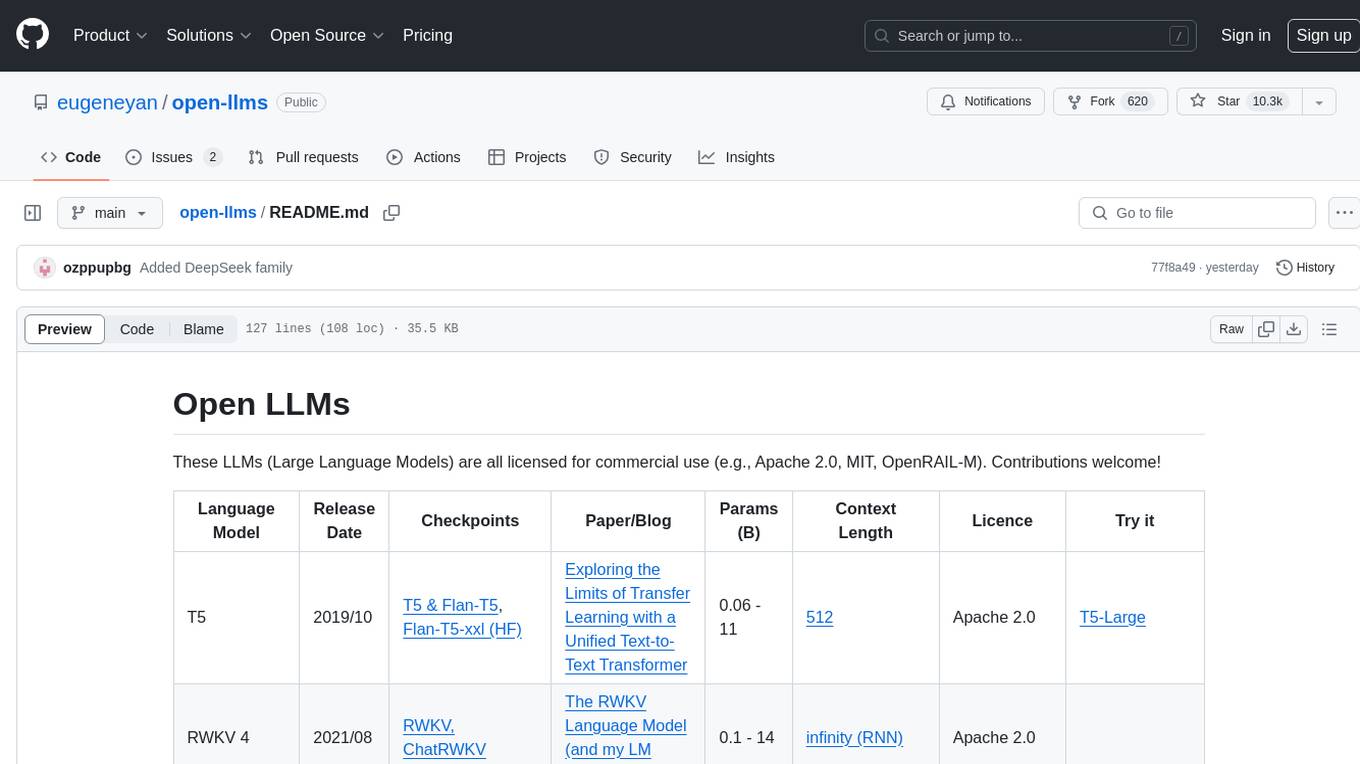
open-llms
Open LLMs is a repository containing various Large Language Models licensed for commercial use. It includes models like T5, GPT-NeoX, UL2, Bloom, Cerebras-GPT, Pythia, Dolly, and more. These models are designed for tasks such as transfer learning, language understanding, chatbot development, code generation, and more. The repository provides information on release dates, checkpoints, papers/blogs, parameters, context length, and licenses for each model. Contributions to the repository are welcome, and it serves as a resource for exploring the capabilities of different language models.
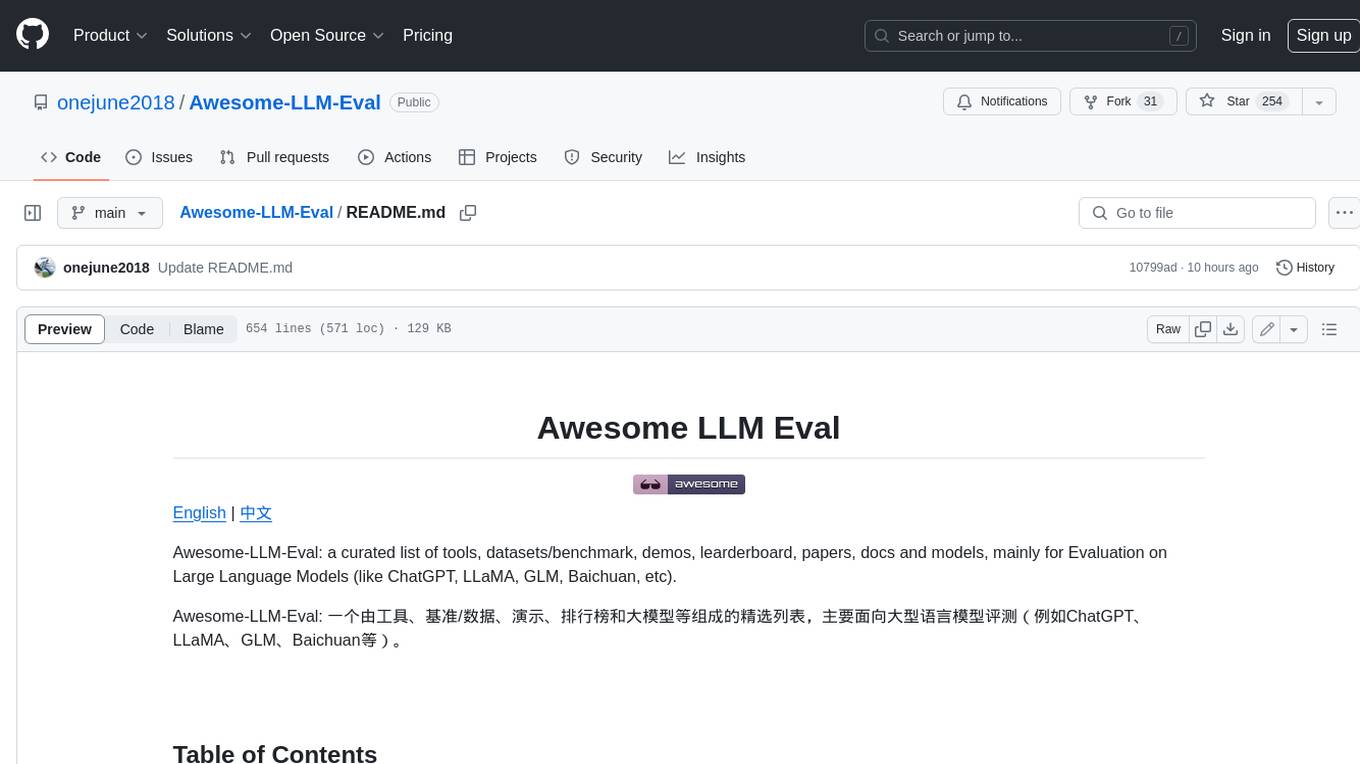
Awesome-LLM-Eval
Awesome-LLM-Eval: a curated list of tools, benchmarks, demos, papers for Large Language Models (like ChatGPT, LLaMA, GLM, Baichuan, etc) Evaluation on Language capabilities, Knowledge, Reasoning, Fairness and Safety.
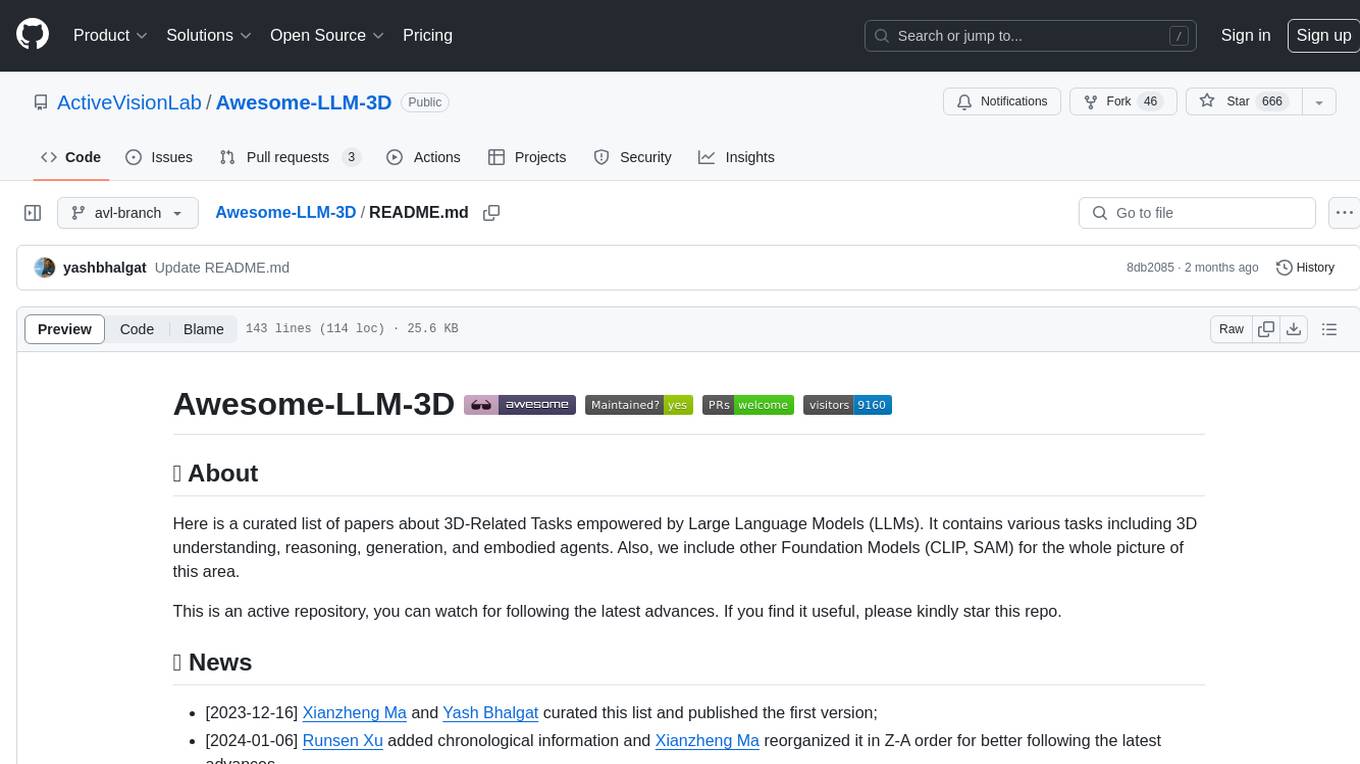
Awesome-LLM-3D
This repository is a curated list of papers related to 3D tasks empowered by Large Language Models (LLMs). It covers tasks such as 3D understanding, reasoning, generation, and embodied agents. The repository also includes other Foundation Models like CLIP and SAM to provide a comprehensive view of the area. It is actively maintained and updated to showcase the latest advances in the field. Users can find a variety of research papers and projects related to 3D tasks and LLMs in this repository.
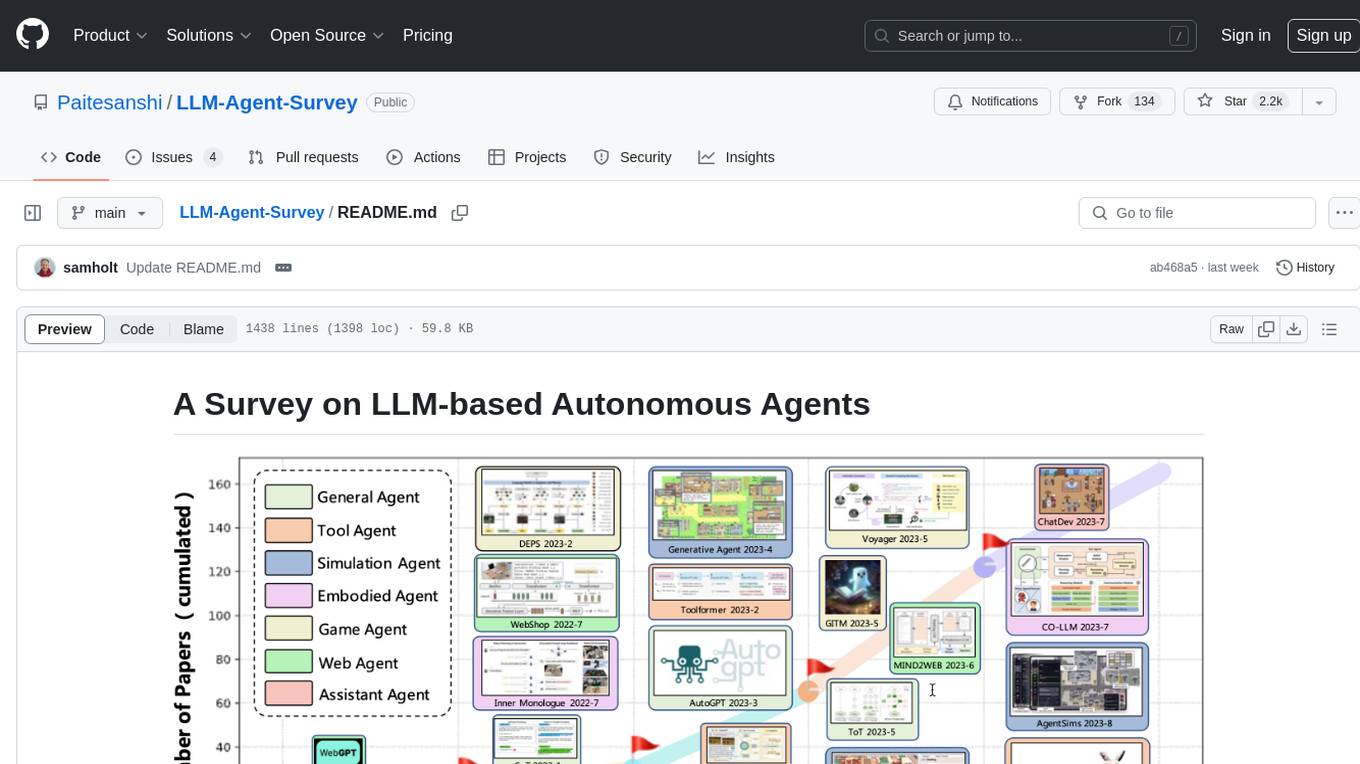
LLM-Agent-Survey
Autonomous agents are designed to achieve specific objectives through self-guided instructions. With the emergence and growth of large language models (LLMs), there is a growing trend in utilizing LLMs as fundamental controllers for these autonomous agents. This repository conducts a comprehensive survey study on the construction, application, and evaluation of LLM-based autonomous agents. It explores essential components of AI agents, application domains in natural sciences, social sciences, and engineering, and evaluation strategies. The survey aims to be a resource for researchers and practitioners in this rapidly evolving field.
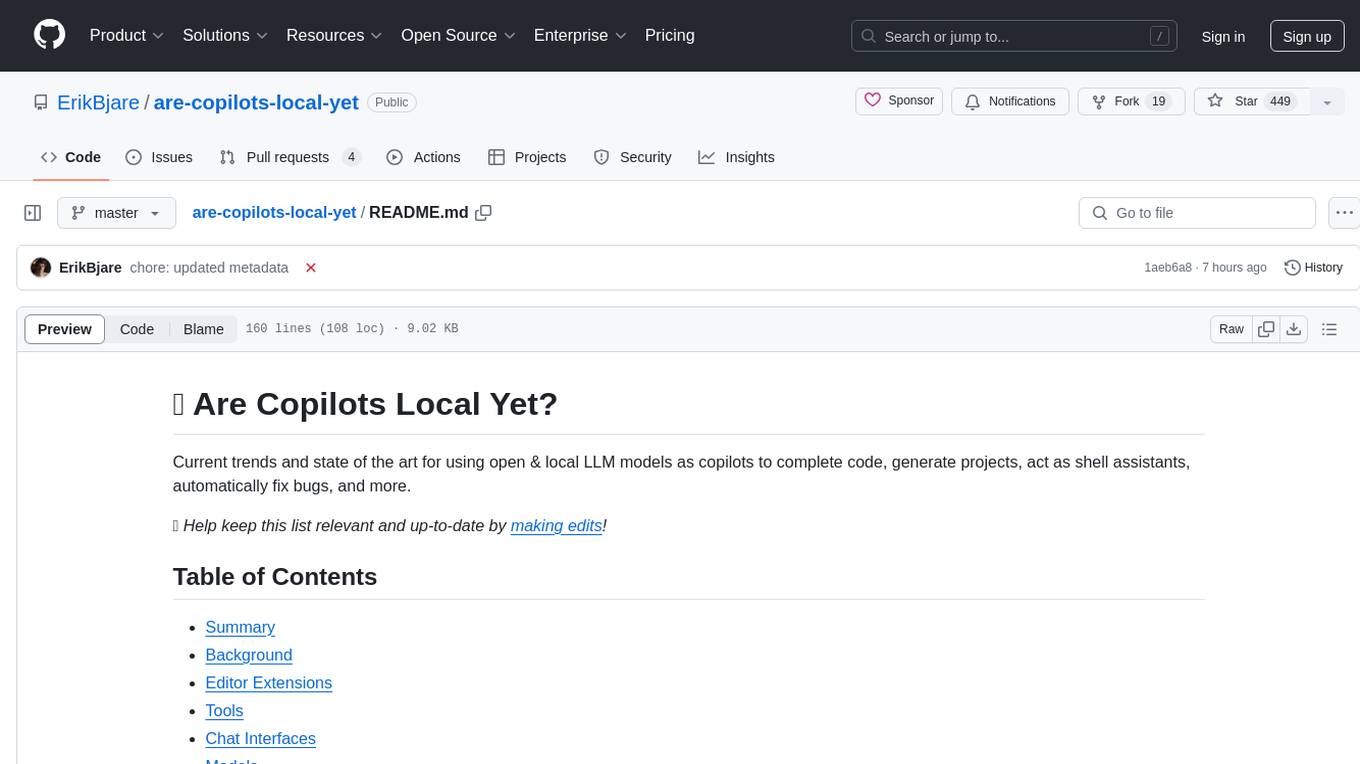
are-copilots-local-yet
Current trends and state of the art for using open & local LLM models as copilots to complete code, generate projects, act as shell assistants, automatically fix bugs, and more. This document is a curated list of local Copilots, shell assistants, and related projects, intended to be a resource for those interested in a survey of the existing tools and to help developers discover the state of the art for projects like these.
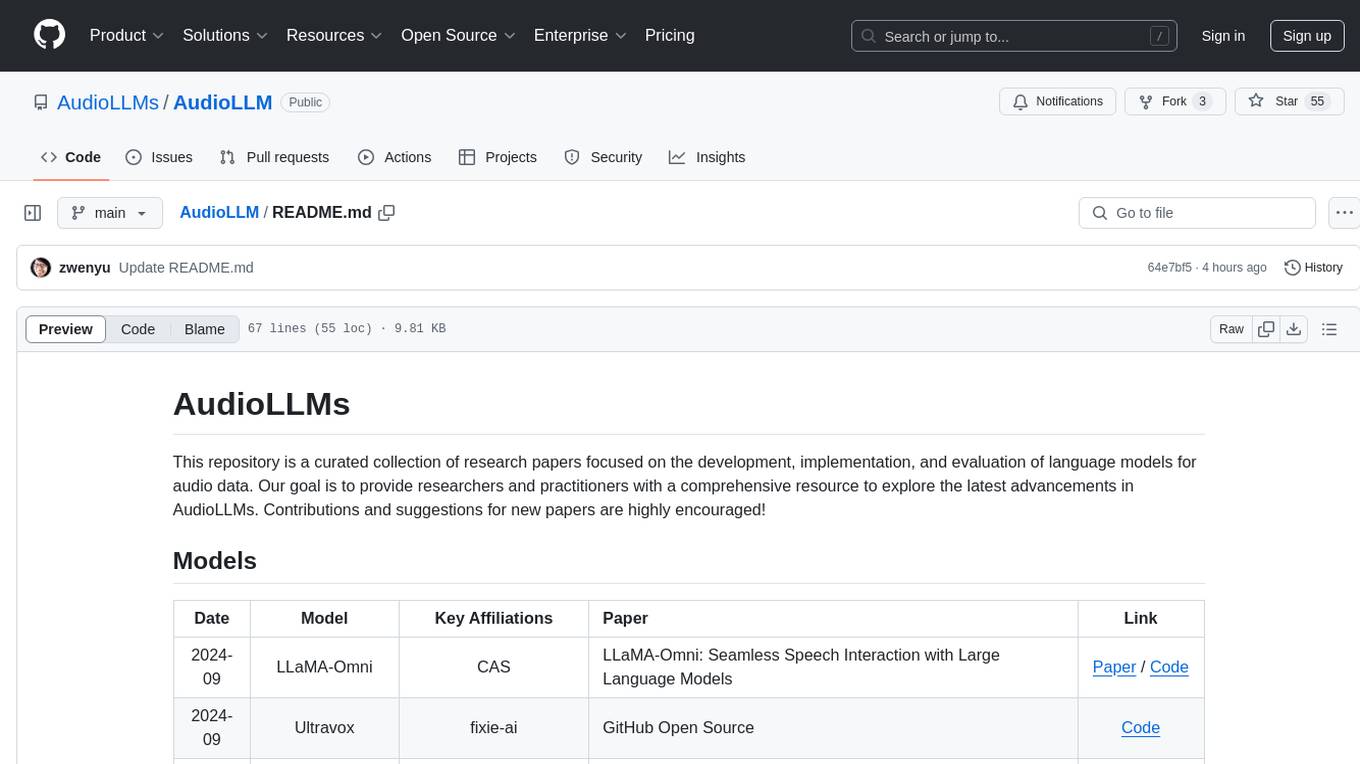
AudioLLM
AudioLLMs is a curated collection of research papers focusing on developing, implementing, and evaluating language models for audio data. The repository aims to provide researchers and practitioners with a comprehensive resource to explore the latest advancements in AudioLLMs. It includes models for speech interaction, speech recognition, speech translation, audio generation, and more. Additionally, it covers methodologies like multitask audioLLMs and segment-level Q-Former, as well as evaluation benchmarks like AudioBench and AIR-Bench. Adversarial attacks such as VoiceJailbreak are also discussed.
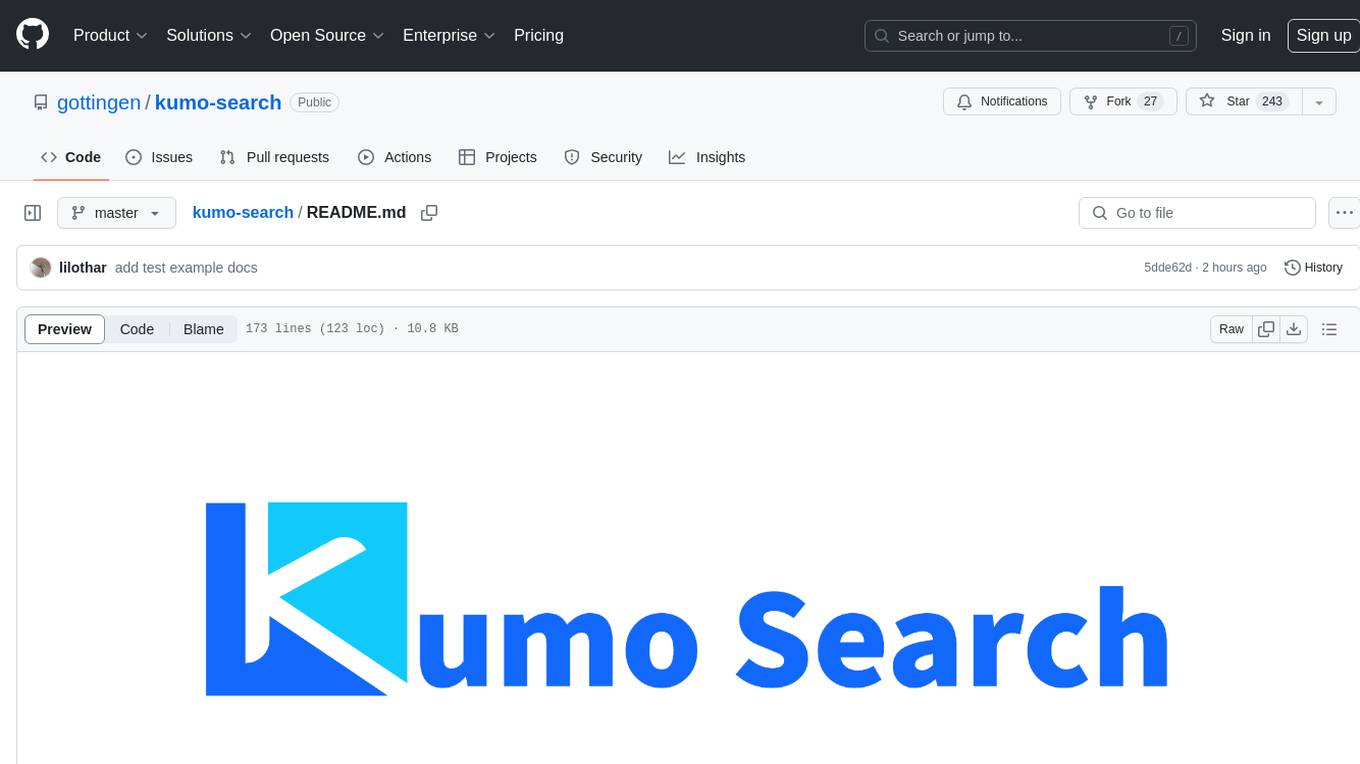
kumo-search
Kumo search is an end-to-end search engine framework that supports full-text search, inverted index, forward index, sorting, caching, hierarchical indexing, intervention system, feature collection, offline computation, storage system, and more. It runs on the EA (Elastic automic infrastructure architecture) platform, enabling engineering automation, service governance, real-time data, service degradation, and disaster recovery across multiple data centers and clusters. The framework aims to provide a ready-to-use search engine framework to help users quickly build their own search engines. Users can write business logic in Python using the AOT compiler in the project, which generates C++ code and binary dynamic libraries for rapid iteration of the search engine.
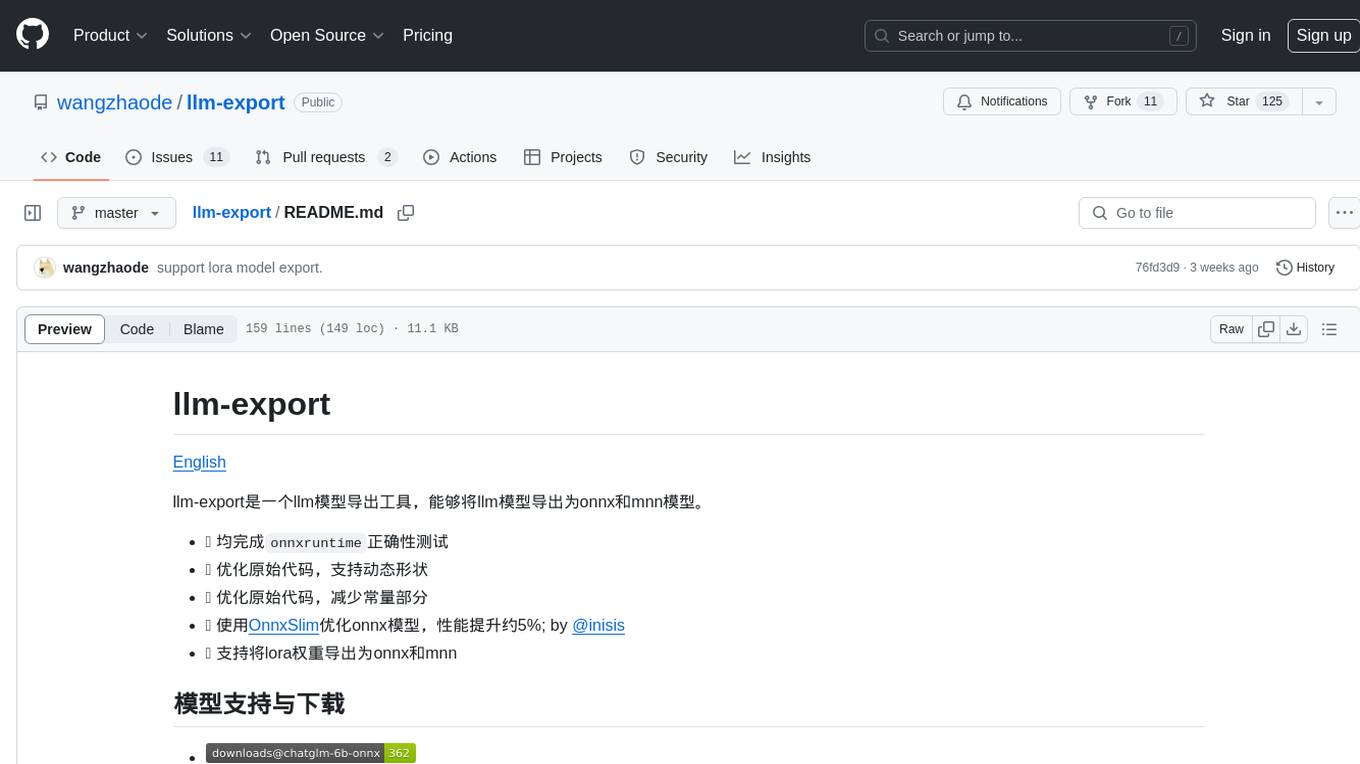
llm-export
llm-export is a tool for exporting llm models to onnx and mnn formats. It has features such as passing onnxruntime correctness tests, optimizing the original code to support dynamic shapes, reducing constant parts, optimizing onnx models using OnnxSlim for performance improvement, and exporting lora weights to onnx and mnn formats. Users can clone the project locally, clone the desired LLM project locally, and use LLMExporter to export the model. The tool supports various export options like exporting the entire model as one onnx model, exporting model segments as multiple models, exporting model vocabulary to a text file, exporting specific model layers like Embedding and lm_head, testing the model with queries, validating onnx model consistency with onnxruntime, converting onnx models to mnn models, and more. Users can specify export paths, skip optimization steps, and merge lora weights before exporting.
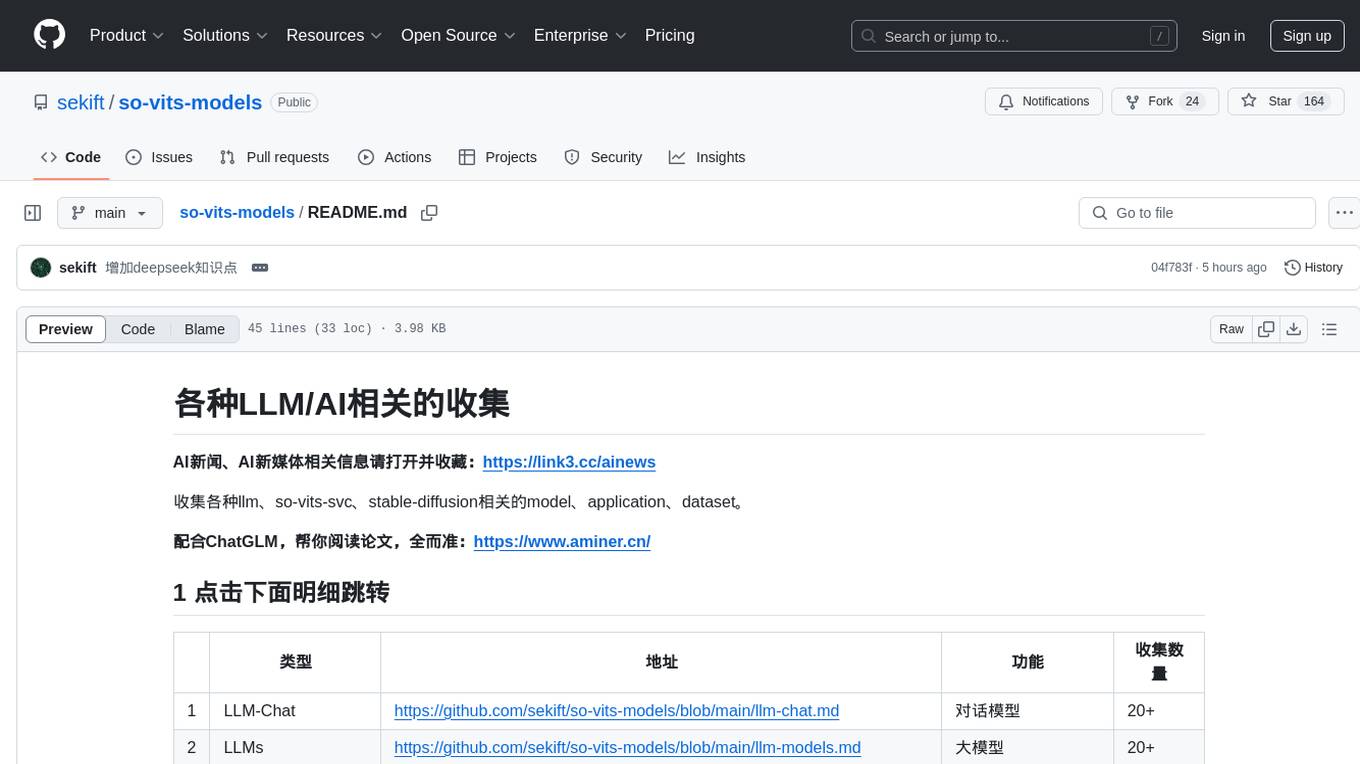
so-vits-models
This repository collects various LLM, AI-related models, applications, and datasets, including LLM-Chat for dialogue models, LLMs for large models, so-vits-svc for sound-related models, stable-diffusion for image-related models, and virtual-digital-person for generating videos. It also provides resources for deep learning courses and overviews, AI competitions, and specific AI tasks such as text, image, voice, and video processing.
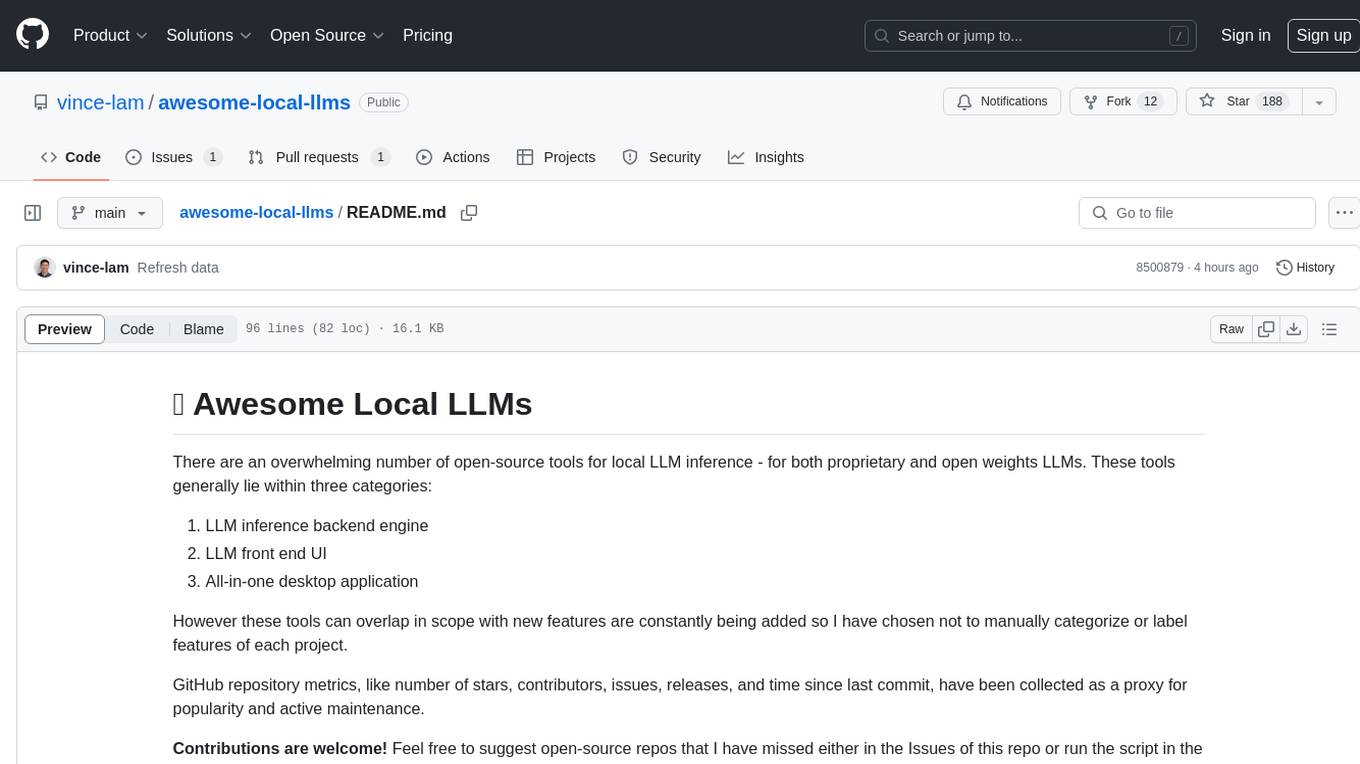
awesome-local-llms
The 'awesome-local-llms' repository is a curated list of open-source tools for local Large Language Model (LLM) inference, covering both proprietary and open weights LLMs. The repository categorizes these tools into LLM inference backend engines, LLM front end UIs, and all-in-one desktop applications. It collects GitHub repository metrics as proxies for popularity and active maintenance. Contributions are encouraged, and users can suggest additional open-source repositories through the Issues section or by running a provided script to update the README and make a pull request. The repository aims to provide a comprehensive resource for exploring and utilizing local LLM tools.
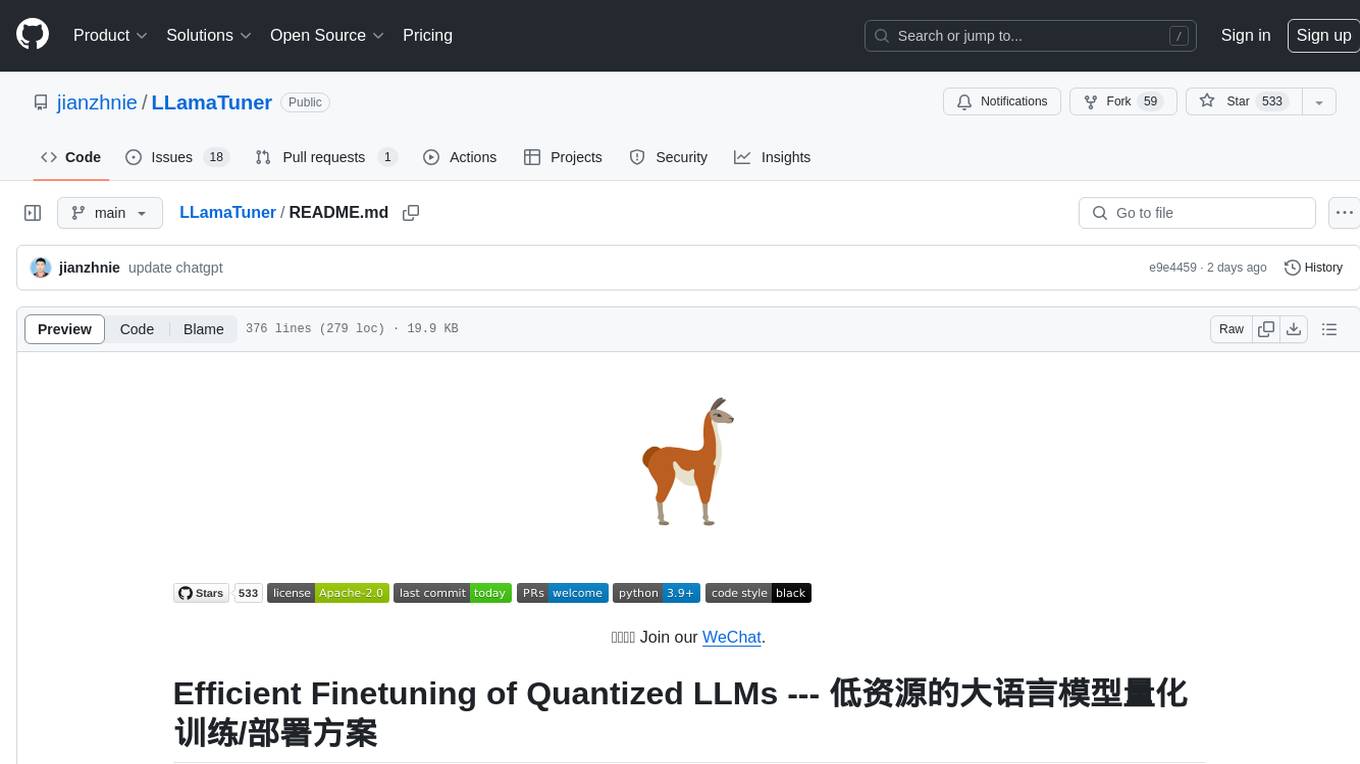
LLamaTuner
LLamaTuner is a repository for the Efficient Finetuning of Quantized LLMs project, focusing on building and sharing instruction-following Chinese baichuan-7b/LLaMA/Pythia/GLM model tuning methods. The project enables training on a single Nvidia RTX-2080TI and RTX-3090 for multi-round chatbot training. It utilizes bitsandbytes for quantization and is integrated with Huggingface's PEFT and transformers libraries. The repository supports various models, training approaches, and datasets for supervised fine-tuning, LoRA, QLoRA, and more. It also provides tools for data preprocessing and offers models in the Hugging Face model hub for inference and finetuning. The project is licensed under Apache 2.0 and acknowledges contributions from various open-source contributors.
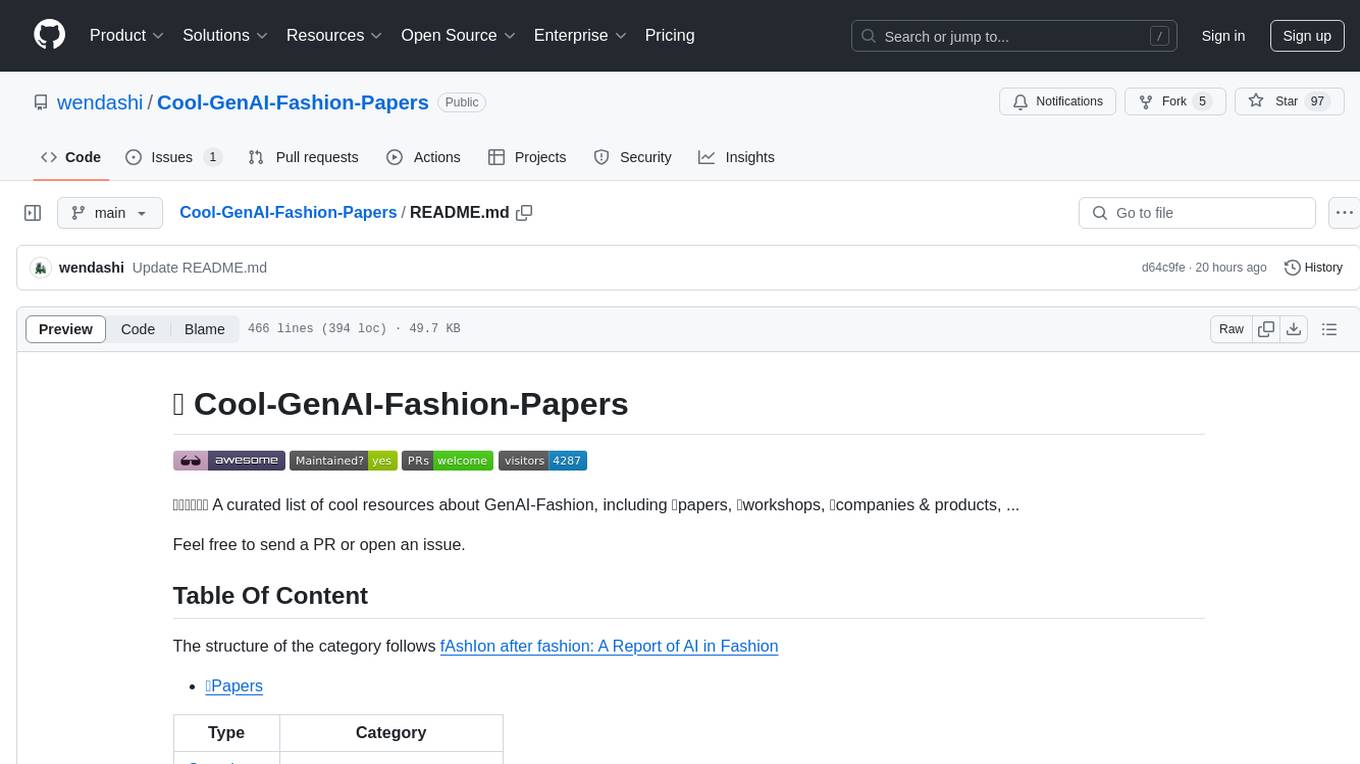
Cool-GenAI-Fashion-Papers
Cool-GenAI-Fashion-Papers is a curated list of resources related to GenAI-Fashion, including papers, workshops, companies, and products. It covers a wide range of topics such as fashion design synthesis, outfit recommendation, fashion knowledge extraction, trend analysis, and more. The repository provides valuable insights and resources for researchers, industry professionals, and enthusiasts interested in the intersection of AI and fashion.
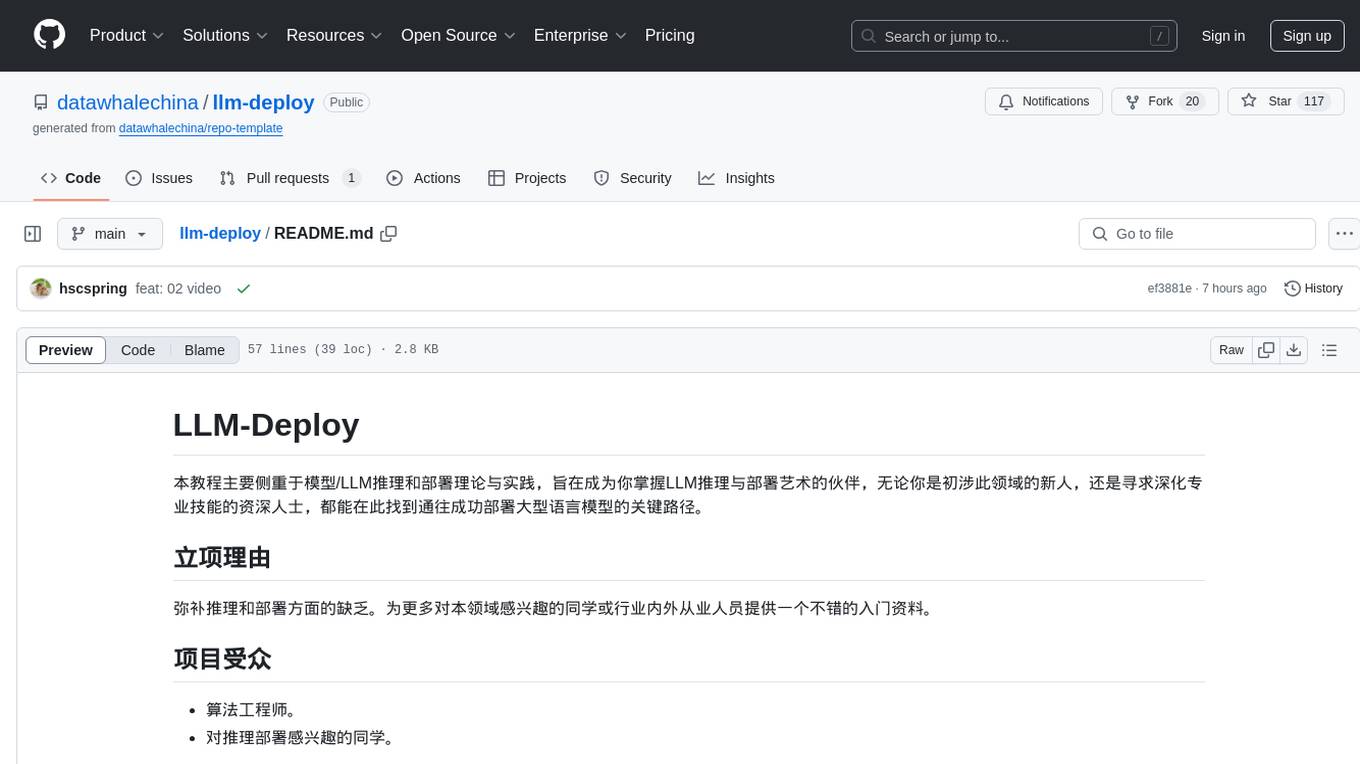
llm-deploy
LLM-Deploy focuses on the theory and practice of model/LLM reasoning and deployment, aiming to be your partner in mastering the art of LLM reasoning and deployment. Whether you are a newcomer to this field or a senior professional seeking to deepen your skills, you can find the key path to successfully deploy large language models here. The project covers reasoning and deployment theories, model and service optimization practices, and outputs from experienced engineers. It serves as a valuable resource for algorithm engineers and individuals interested in reasoning deployment.
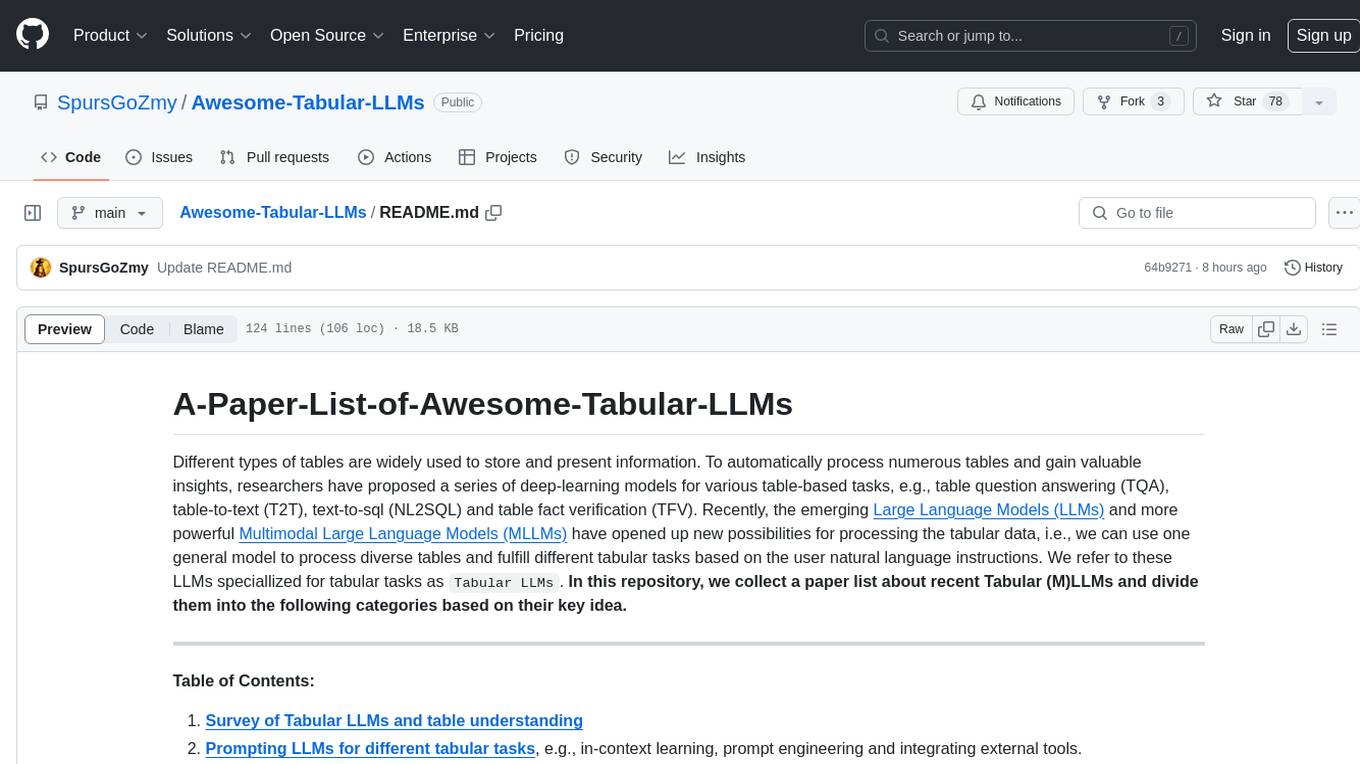
Awesome-Tabular-LLMs
This repository is a collection of papers on Tabular Large Language Models (LLMs) specialized for processing tabular data. It includes surveys, models, and applications related to table understanding tasks such as Table Question Answering, Table-to-Text, Text-to-SQL, and more. The repository categorizes the papers based on key ideas and provides insights into the advancements in using LLMs for processing diverse tables and fulfilling various tabular tasks based on natural language instructions.
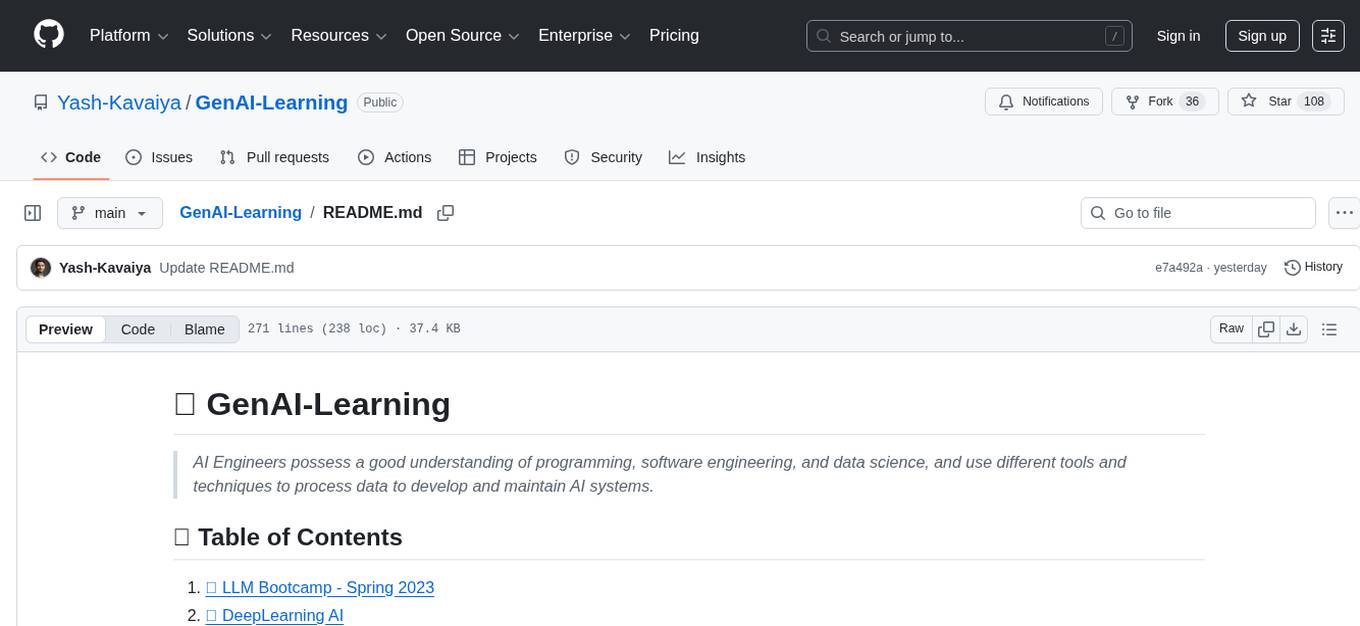
GenAI-Learning
GenAI-Learning is a repository dedicated to providing resources and courses for individuals interested in Generative AI. It covers a wide range of topics from prompt engineering to user-centered design, offering courses on LLM Bootcamp, DeepLearning AI, Microsoft Copilot Learning, Amazon Generative AI, Google Cloud Skills, NVIDIA Learn, Oracle Cloud, and IBM AI Learn. The repository includes detailed course descriptions, partners, and topics for each course, making it a valuable resource for AI enthusiasts and professionals.
For similar tasks

Github-Ranking-AI
This repository provides a list of the most starred and forked repositories on GitHub. It is updated automatically and includes information such as the project name, number of stars, number of forks, language, number of open issues, description, and last commit date. The repository is divided into two sections: LLM and chatGPT. The LLM section includes repositories related to large language models, while the chatGPT section includes repositories related to the chatGPT chatbot.
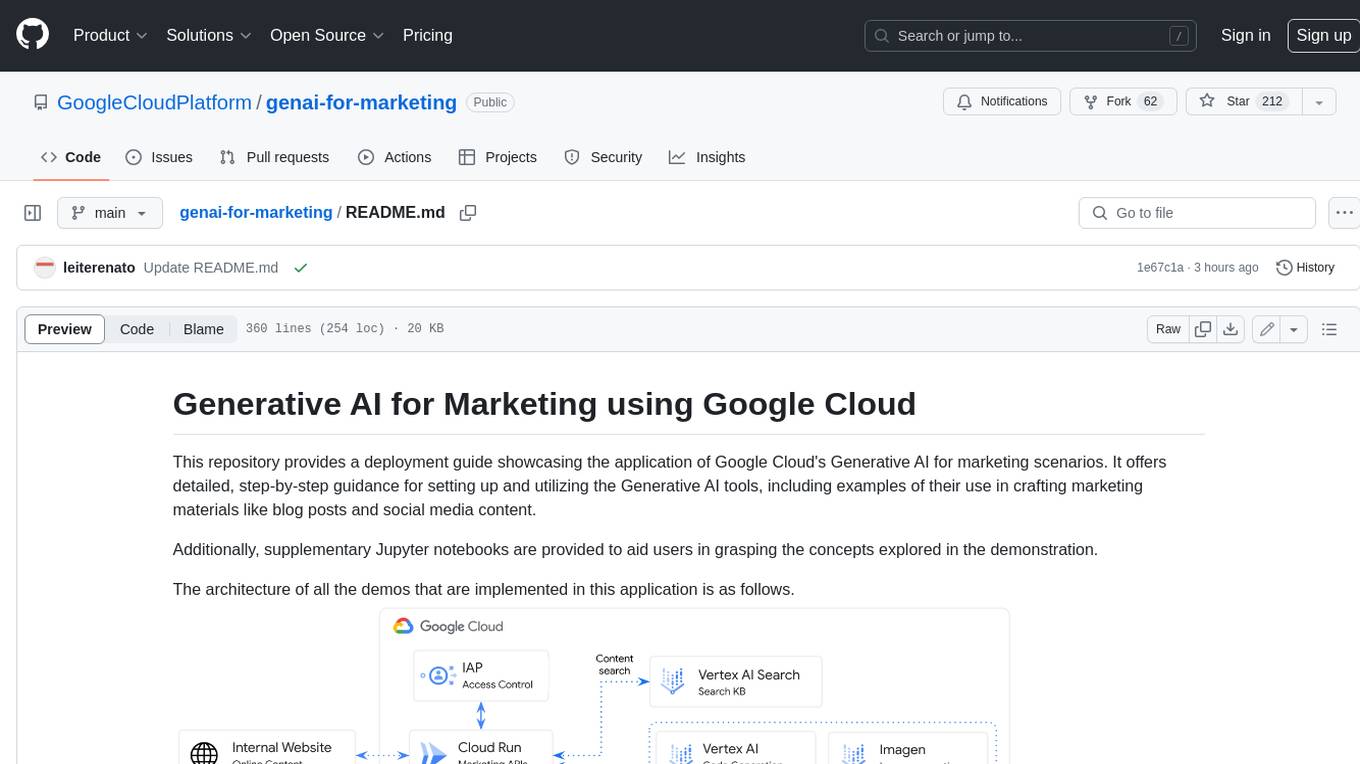
genai-for-marketing
This repository provides a deployment guide for utilizing Google Cloud's Generative AI tools in marketing scenarios. It includes step-by-step instructions, examples of crafting marketing materials, and supplementary Jupyter notebooks. The demos cover marketing insights, audience analysis, trendspotting, content search, content generation, and workspace integration. Users can access and visualize marketing data, analyze trends, improve search experience, and generate compelling content. The repository structure includes backend APIs, frontend code, sample notebooks, templates, and installation scripts.
For similar jobs

weave
Weave is a toolkit for developing Generative AI applications, built by Weights & Biases. With Weave, you can log and debug language model inputs, outputs, and traces; build rigorous, apples-to-apples evaluations for language model use cases; and organize all the information generated across the LLM workflow, from experimentation to evaluations to production. Weave aims to bring rigor, best-practices, and composability to the inherently experimental process of developing Generative AI software, without introducing cognitive overhead.

agentcloud
AgentCloud is an open-source platform that enables companies to build and deploy private LLM chat apps, empowering teams to securely interact with their data. It comprises three main components: Agent Backend, Webapp, and Vector Proxy. To run this project locally, clone the repository, install Docker, and start the services. The project is licensed under the GNU Affero General Public License, version 3 only. Contributions and feedback are welcome from the community.

oss-fuzz-gen
This framework generates fuzz targets for real-world `C`/`C++` projects with various Large Language Models (LLM) and benchmarks them via the `OSS-Fuzz` platform. It manages to successfully leverage LLMs to generate valid fuzz targets (which generate non-zero coverage increase) for 160 C/C++ projects. The maximum line coverage increase is 29% from the existing human-written targets.

LLMStack
LLMStack is a no-code platform for building generative AI agents, workflows, and chatbots. It allows users to connect their own data, internal tools, and GPT-powered models without any coding experience. LLMStack can be deployed to the cloud or on-premise and can be accessed via HTTP API or triggered from Slack or Discord.

VisionCraft
The VisionCraft API is a free API for using over 100 different AI models. From images to sound.

kaito
Kaito is an operator that automates the AI/ML inference model deployment in a Kubernetes cluster. It manages large model files using container images, avoids tuning deployment parameters to fit GPU hardware by providing preset configurations, auto-provisions GPU nodes based on model requirements, and hosts large model images in the public Microsoft Container Registry (MCR) if the license allows. Using Kaito, the workflow of onboarding large AI inference models in Kubernetes is largely simplified.

PyRIT
PyRIT is an open access automation framework designed to empower security professionals and ML engineers to red team foundation models and their applications. It automates AI Red Teaming tasks to allow operators to focus on more complicated and time-consuming tasks and can also identify security harms such as misuse (e.g., malware generation, jailbreaking), and privacy harms (e.g., identity theft). The goal is to allow researchers to have a baseline of how well their model and entire inference pipeline is doing against different harm categories and to be able to compare that baseline to future iterations of their model. This allows them to have empirical data on how well their model is doing today, and detect any degradation of performance based on future improvements.

Azure-Analytics-and-AI-Engagement
The Azure-Analytics-and-AI-Engagement repository provides packaged Industry Scenario DREAM Demos with ARM templates (Containing a demo web application, Power BI reports, Synapse resources, AML Notebooks etc.) that can be deployed in a customer’s subscription using the CAPE tool within a matter of few hours. Partners can also deploy DREAM Demos in their own subscriptions using DPoC.